 |
John and Sheila's overland journey to Timbuktu
by train, bus and riverboat,
November 1998 |
Our route by train, bus and boat through Senegal and Mali to Timbuktu, and on by minibus to Ouagadougou in Burkina Faso, then a side trip to Saint Louis back in Senegal.
|
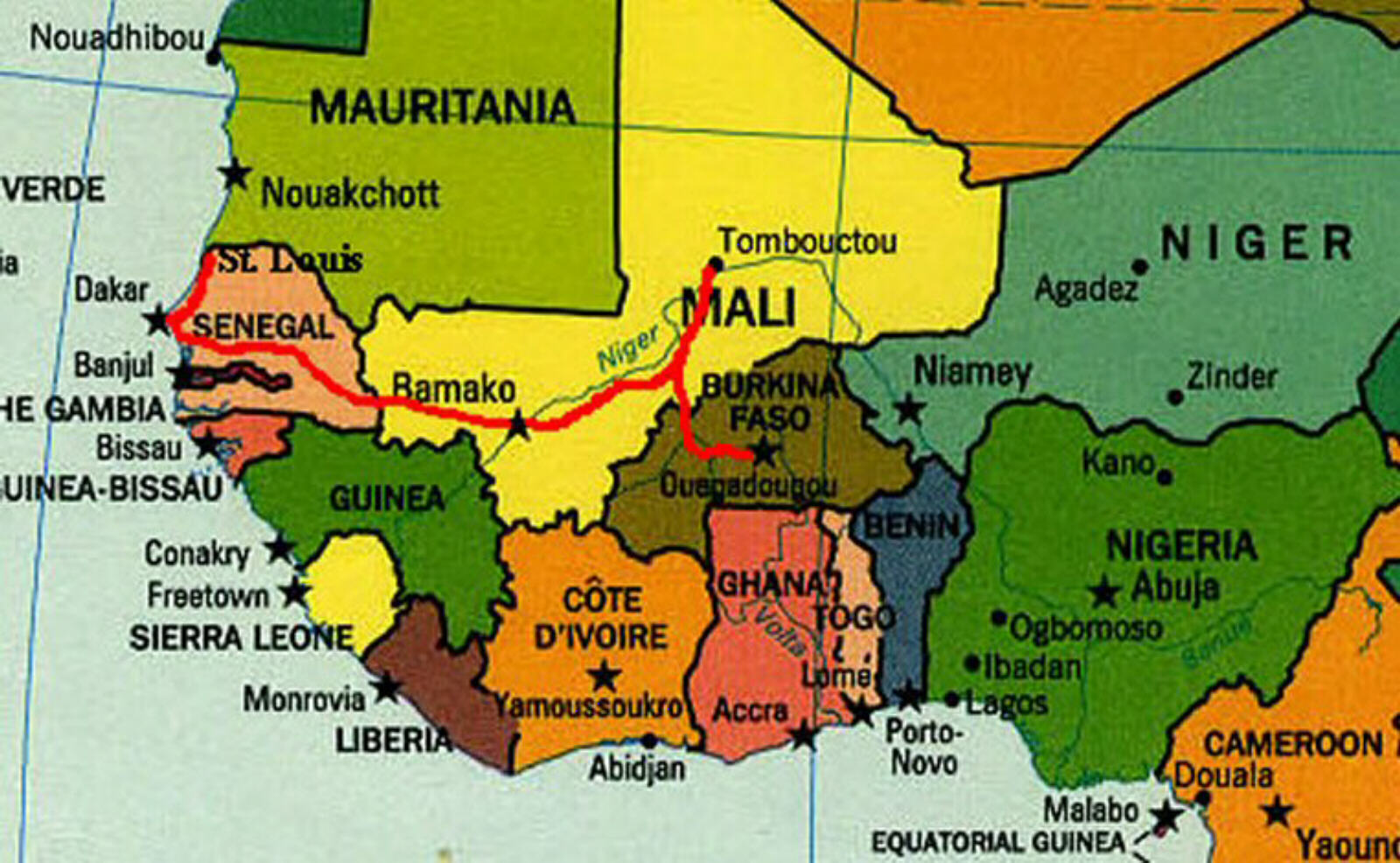
|
Senegal - Dakar and Gorée island
|
Sunday 8th. We flew to Dakar by Air France, who were offering the cheapest fare from London (£464 each inc. taxes). We had no problems at immigration and customs but then came the inevitable hassle with the taxi driver. We ended up crammed into a small taxi with the driver, the taxi tout and a hotel tout. We insisted he took us to the hotel we had booked by phone from England but it was awful. Sheila took one look at the cockroaches and walked out, so we gave in and went to the tout's choice, which was nicer but more expensive. We had the obligatory row about the price of the taxi (fixed price posted in the airport - oh no, it doesn't apply in the evening, anyway you went to two hotels not one - oh no, that was your idea not ours, etc. etc.) and did not part friends. However, after a couple of beers and highlights of Newcastle vs. Manchester United on the TV in the bar things looked more cheerful.
Mon 9th. The hotel Tabara was surprisingly clean and had the CNN news channel on the TV in the room. Not too bad for 28,000 CFA (West African francs, about £30). We had a morning of arranging things. Walked to the town centre (Independence Square) and changed some travellers cheques at the bank. There is no currency black market because the CFA is pegged at 100 to the French franc and so is sort of a hard currency - in fact French francs are accepted in many places. We went on to the Mali embassy to apply for visas, which they said would be ready on Wednesday afternoon. Next we got a taxi to the railway station (taxi trips in the city centre are 500 CFA (about 50p) - sometimes after haggling, sometimes without) which is an interesting building with, for some reason, a goat tethered at an upstairs balcony! There we ascertained that the train to Mali runs on Wednesday morning and Saturday morning, which doesn't fit very well with the timing of the visas. |
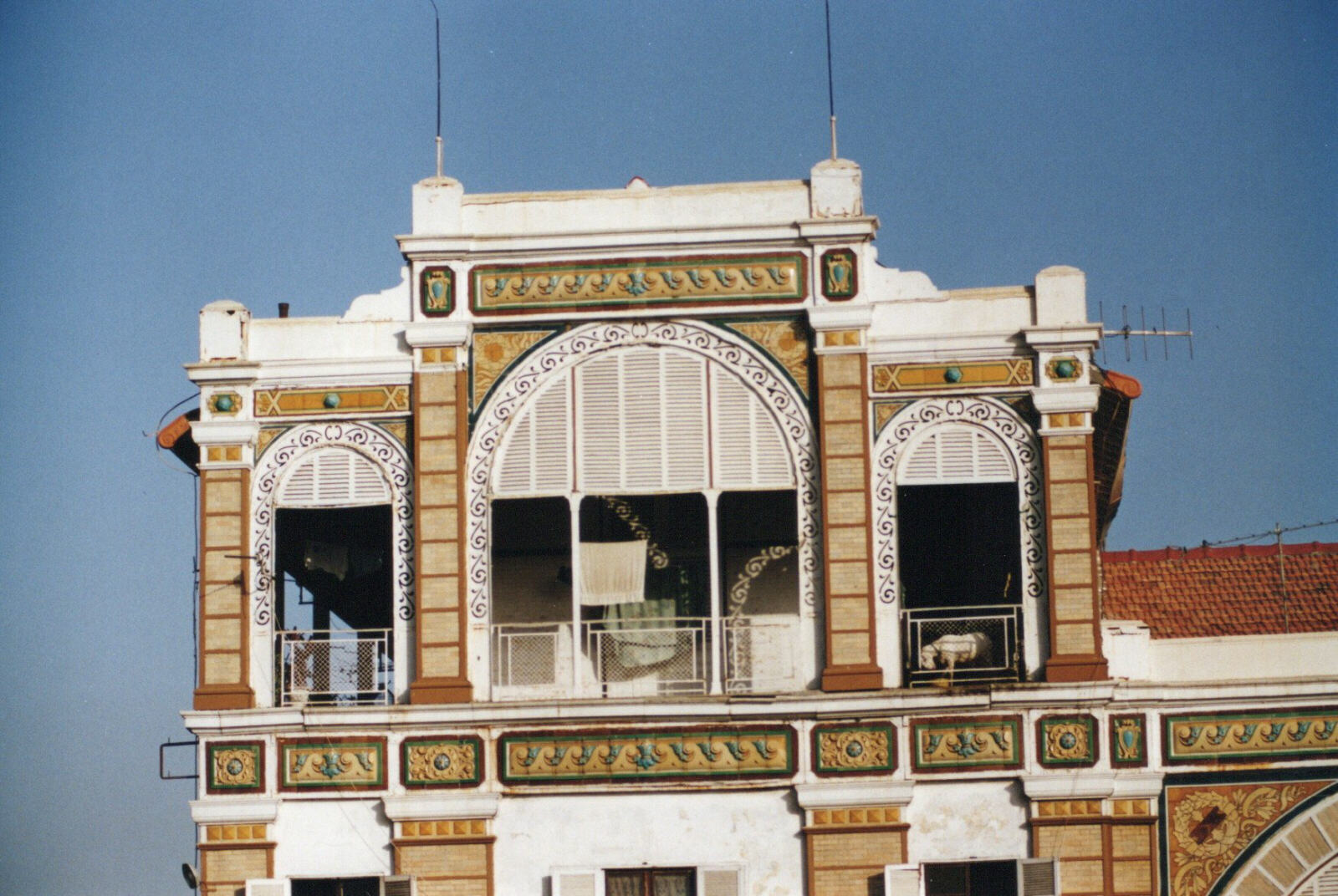
|
We stopped for an ice cream at a café overlooking Independence Square to ponder this one and decided to go back to the embassy and see if they could do them earlier. A really nice man there who spoke good English spent some time arranging it and said yes, they'd be ready on Tuesday - then it emerged that he didn't even work at the embassy, he was just visiting on business! We got to talking about Timbuktu and he said a man upstairs in the embassy came from there and he arranged for us to go up and see him - when we finally got there after filling in an application form we met what appeared to be the ambassador! He was very friendly but did not speak much English so we didn't learn much about Timbuktu. Next we went to Air France to tell them they'd broken our suitcase, by knocking loose one of the handles. We didn't want it falling off just as we were boarding a train in the middle of a Rugby scrum so they promised to fix it if we brought it in tomorrow. Feeling we'd achieved a lot we went back to the Tabara hotel and sat by the pool and had a cup of tea and a shawarma sandwich.
After whiling away the midday heat we suddenly decided to go on the ferry to Gorée Island, a picturesque spot 3 km out of Dakar harbour. We caught the 4 o'clock ferry (3000CFA return, £3.30) and went for a stroll around the island. There are no cars or even bicycles here and fewer people trying to sell you things than in Dakar.
|
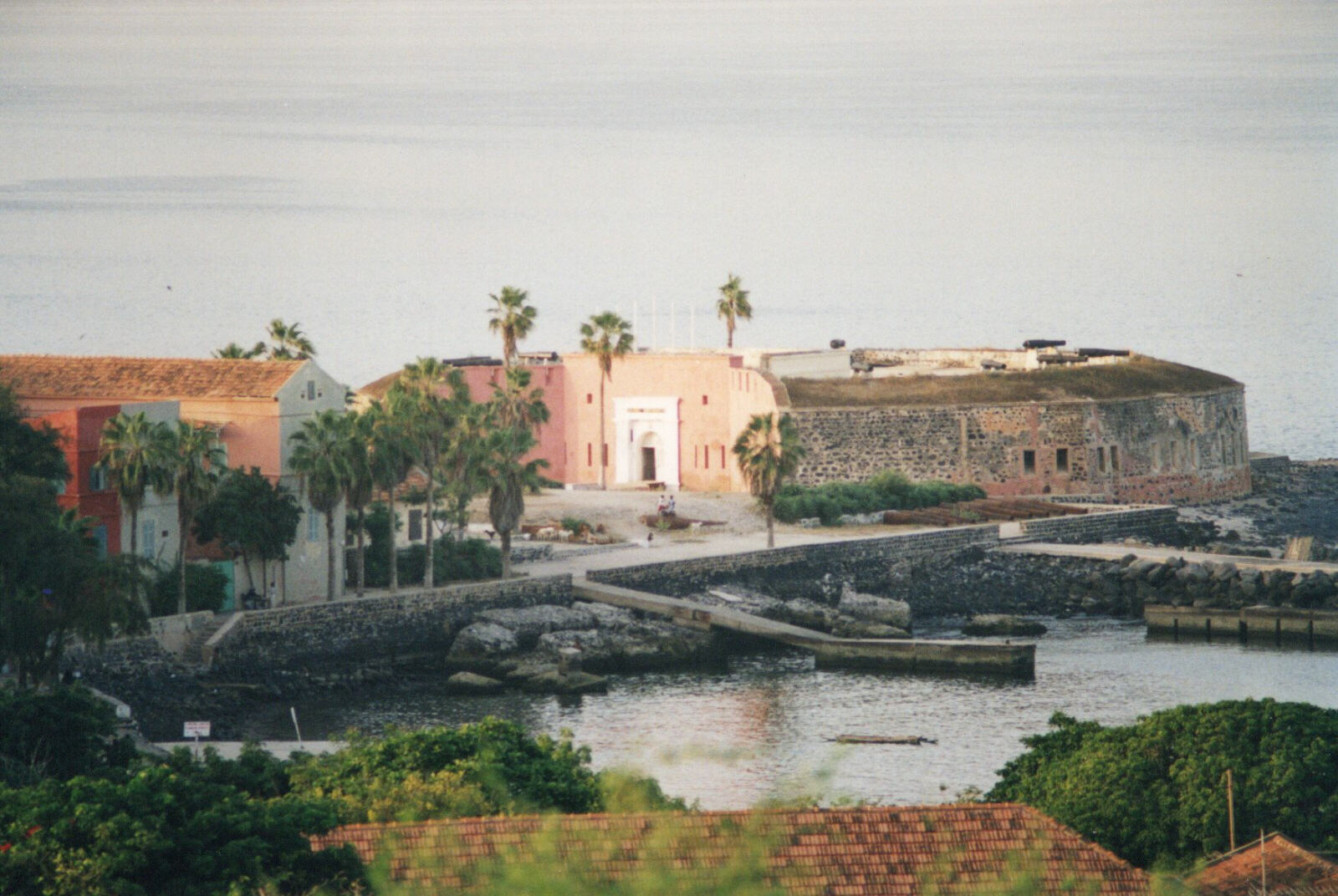
|
We went through the little town with interesting old colonial-style buildings up to le Castel, a sort of fortified plateau perched on top of imposing cliffs which were used in the opening sequence of the film 'Guns of Navarone' (because there weren't any cliffs in Greece that looked Greek enough). |
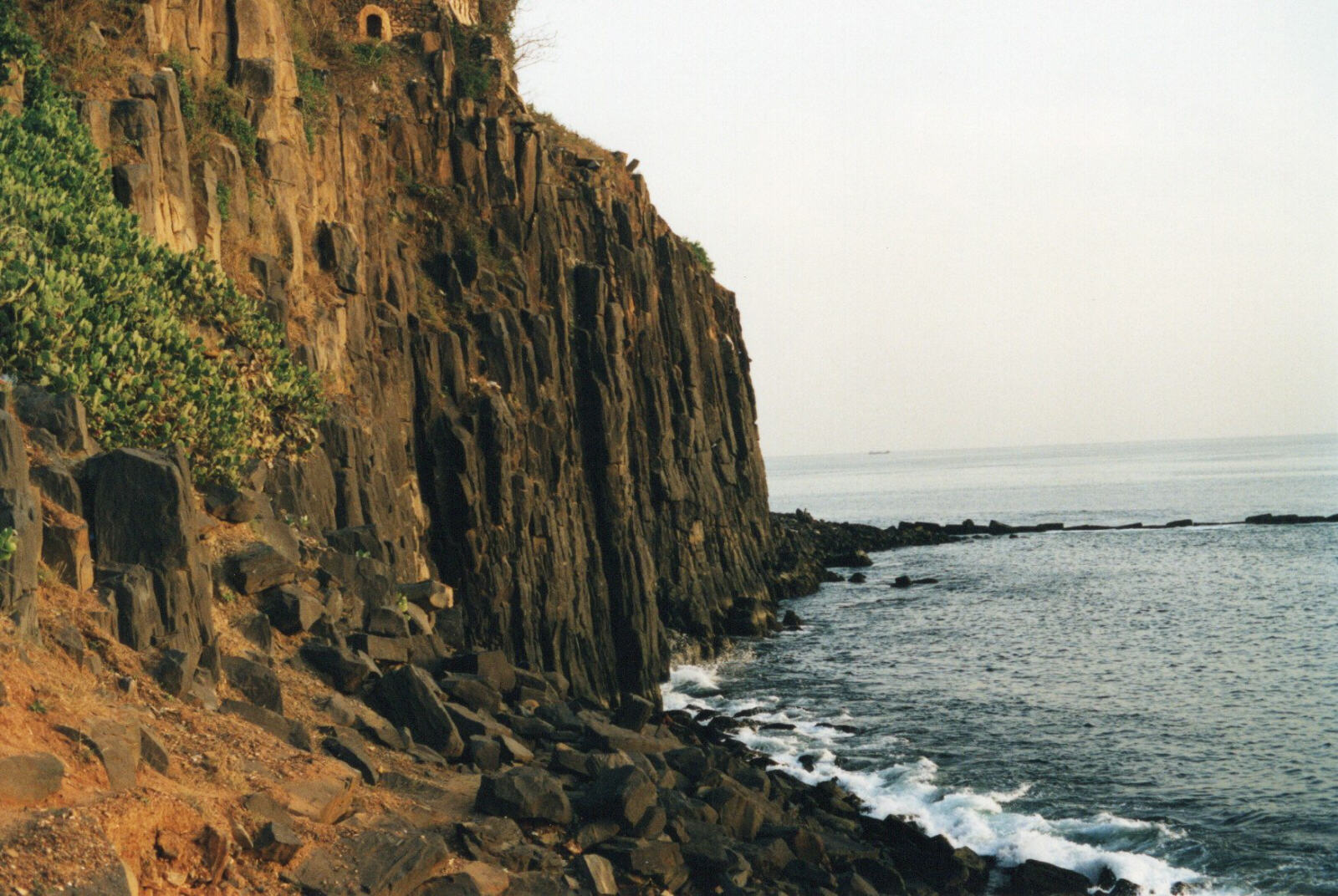
|
After wandering down to the fort at the other end of the island (it's only about half a mile long) we came to Le Chevalier de Boufflers, the best restaurant and only hotel on the island (5 rooms). As darkness fell we dined at a table by the harbour wall to the sound of the waves breaking below and had a very good seafood meal and a welcome couple of beers for 155 FF. Just as I was finishing an excellent cup of Earl Grey tea we saw the ferry approaching the jetty and departed back to Dakar. |
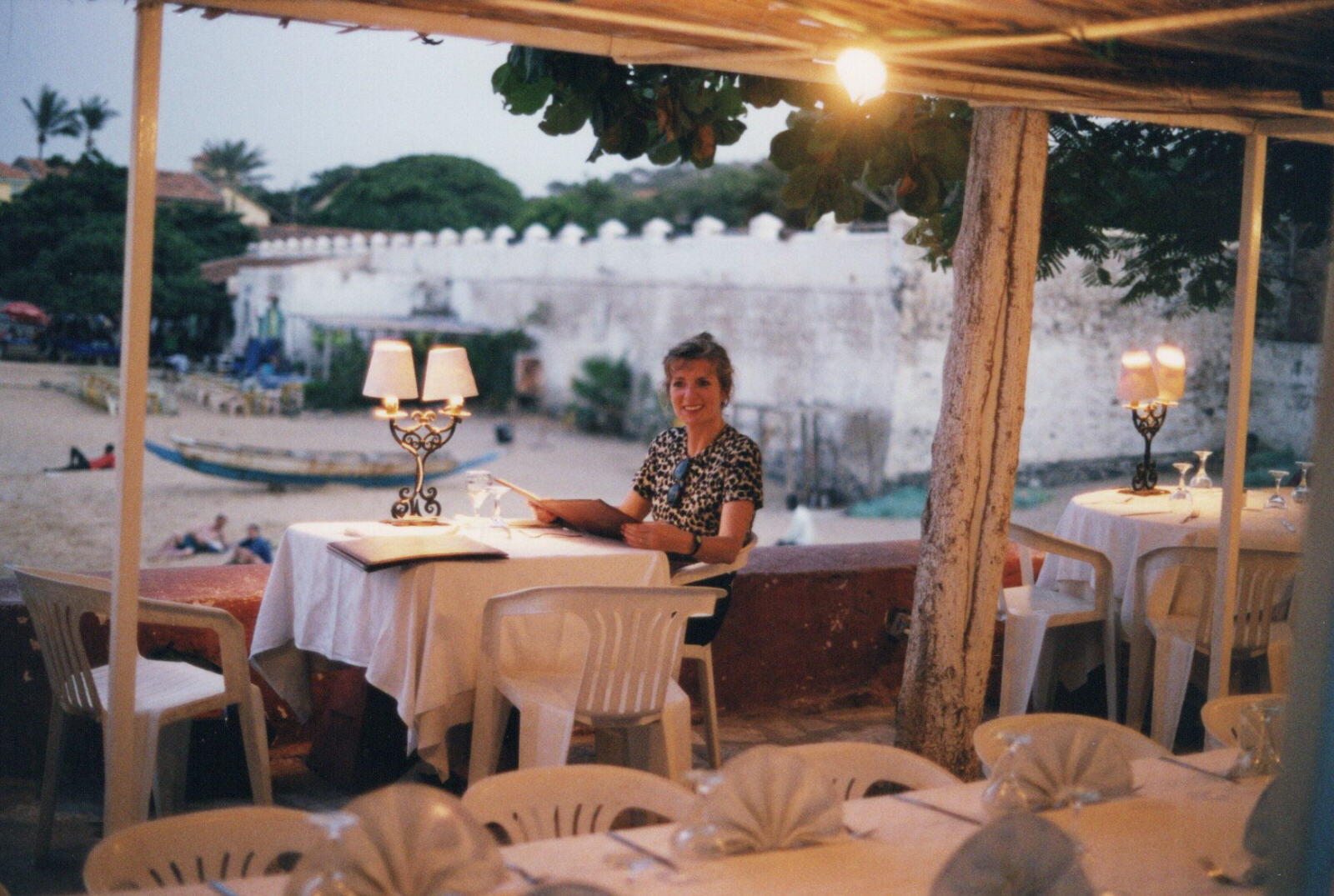
|
Tues 10th. We set off to carry on arranging things but when we got to the station to book our couchettes for tomorrow nobody was there, then when we went to Air France to hand in the suitcase the lady in charge was off sick (we thought, from what the man on reception said in French). However, as we were sitting and waiting for someone else to come, she turned up, fit as anything, so somebody was confused, probably us. She promised to have it ready by 5pm and we went across the road to a very Parisienne patisserie and café for breakfast. Then we returned to the railway station to discover that all the couchettes were fully booked, which was a bit of a disaster because we didn't fancy sitting up all the way on a 30-hour train ride. We asked the station chief if there was anything he could do and he spoke to the man in charge of reservations who said come back at 4 o'clock. We returned to the hotel for a sunbathe by the pool. At 2 o'clock we got a taxi to the Mali embassy and collected the visas with no problem, walked through the city centre to the bank to change enough money for the train tickets and down to the station to see the man in charge of reservations. He said, well, there were still two people who had reserved couchettes but not paid yet and he'd promised to hold them but, well, maybe if we bought him a drink he'd rub their names out and write ours in. All this in French, of course, but we got the message and concluded an amicable deal - tickets 51,000CFA (£56) each and 3000 (£3.30) for the drink. We were just happy to get it sorted out rather than wait three days for the next train.
We wandered through the shops and the market back to Air France where our suitcase was all present and mended. The lady in charge of external relations, Claudine Alcantara, was very interested in our planned journey but she said sorry, everywhere you're going they only speak French! She didn't know if there'd be a restaurant car on the train so we went and bought provisions - bottled drinks and cheese and biscuits from a Lebanese-run corner store, packets of nuts and packets of freshly sliced mango from street vendors. At the corner store we met a man from Godalming UK whose wife worked at the French embassy. He was rather disillusioned with Britain, the world and life in general and he warned us to watch out for pickpockets. Sure enough, we had to fight them off all the way back to the hotel - they come crowding round you pretending to sell you things or pretending to point out something on your foot and while you're bending down their hand's in your pocket. After we beat them off we saw them homing in on some French tourists and we had to run and make a fuss to warn them.
After all this activity we went back to the hotel to cool off then walked down to the main street, Avenue Pompidou, to find an evening meal. The first thing we found was a wonderful ice cream parlour and had a dish of sorbets. In the next block was the Al Khayam restaurant where we had a tasty shawarma (like a donner kebab) and a fizzy lemonade each for 2200CFA (£2.50).
Wed 11th. We had a leisurely start, but by the time we'd finished packing everything up it was time to leave for the train. We had so many carrier bags full of food and drink that our usual mobility (one airline crew-bag with wheels and one shoulder bag each) was severely compromised and the taxi driver had to help carry it all into the station. We found our sleeping compartment and Sheila had great fun spring cleaning it - blasting the bugs with bug spray and batting them with her shoe; by the time she had finished it was quite cosy. While Sheila set about the bugs I went out to the market and bought lots of little packets full of freshly cut mango for refreshment. It was a four-berth compartment and the other two who turned up were a Senegalese chap and his uncle, who had never been on a train before. He spent the time reciting his prayers in a whisper, either because he was very devout or he had heard about Senegalese train drivers.
At 10 o'clock something completely unexpected happened - the train started moving, exactly on time. However, half an hour later it came to a halt again. It turned out that there had been a derailment and one of the carriages further back was half off the rails. They were trying to get it back on by jacking it up onto big wooden blocks, but as I was standing watching (with the entire population from a 10-mile radius) it fell off the jack and swayed precariously towards us, while I raced out of the way with the rest of the crowd.
|
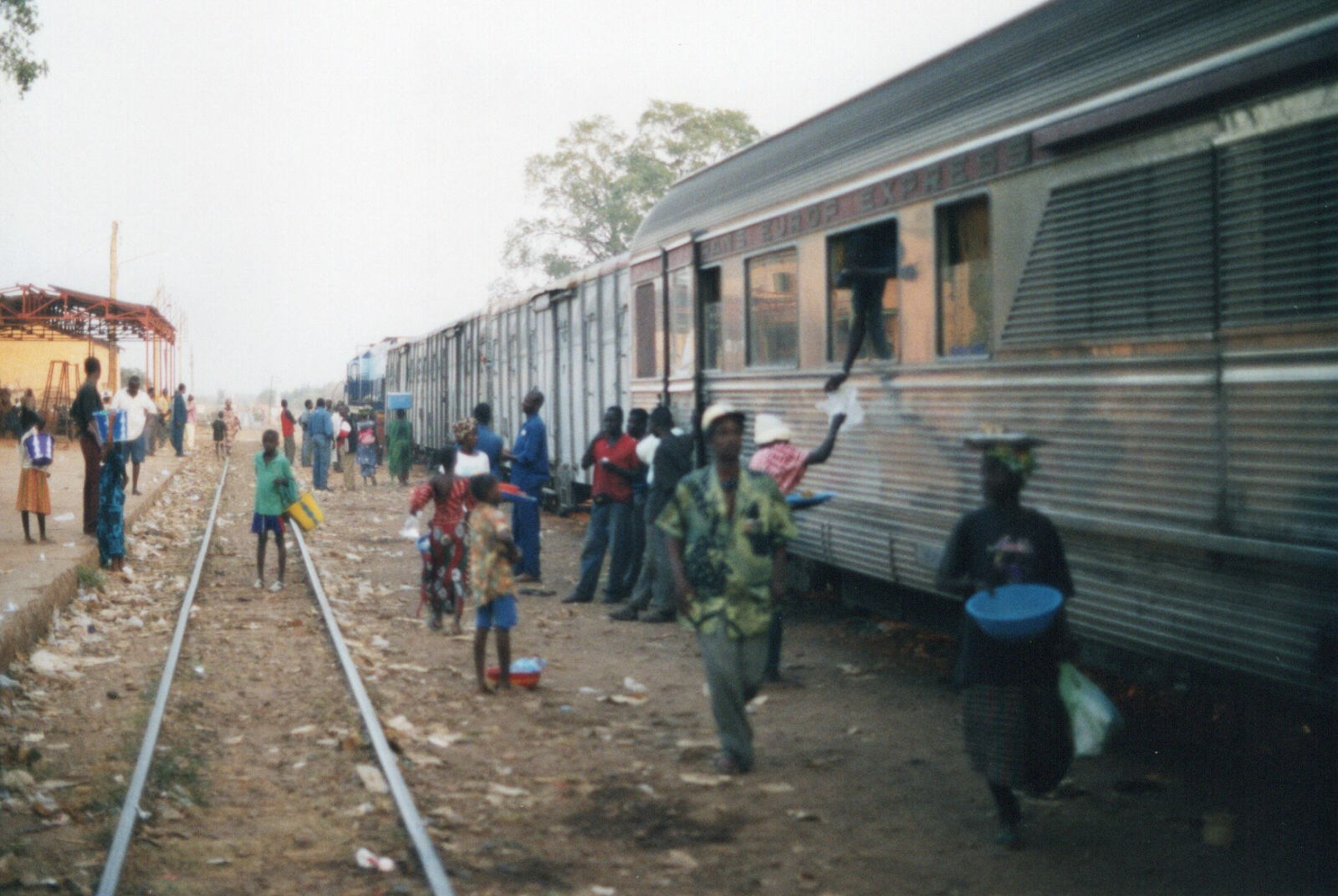
|
We got going again after about two hours and trundled across the endless bush, flat dry grassland dotted with strange-shaped baobab trees. |
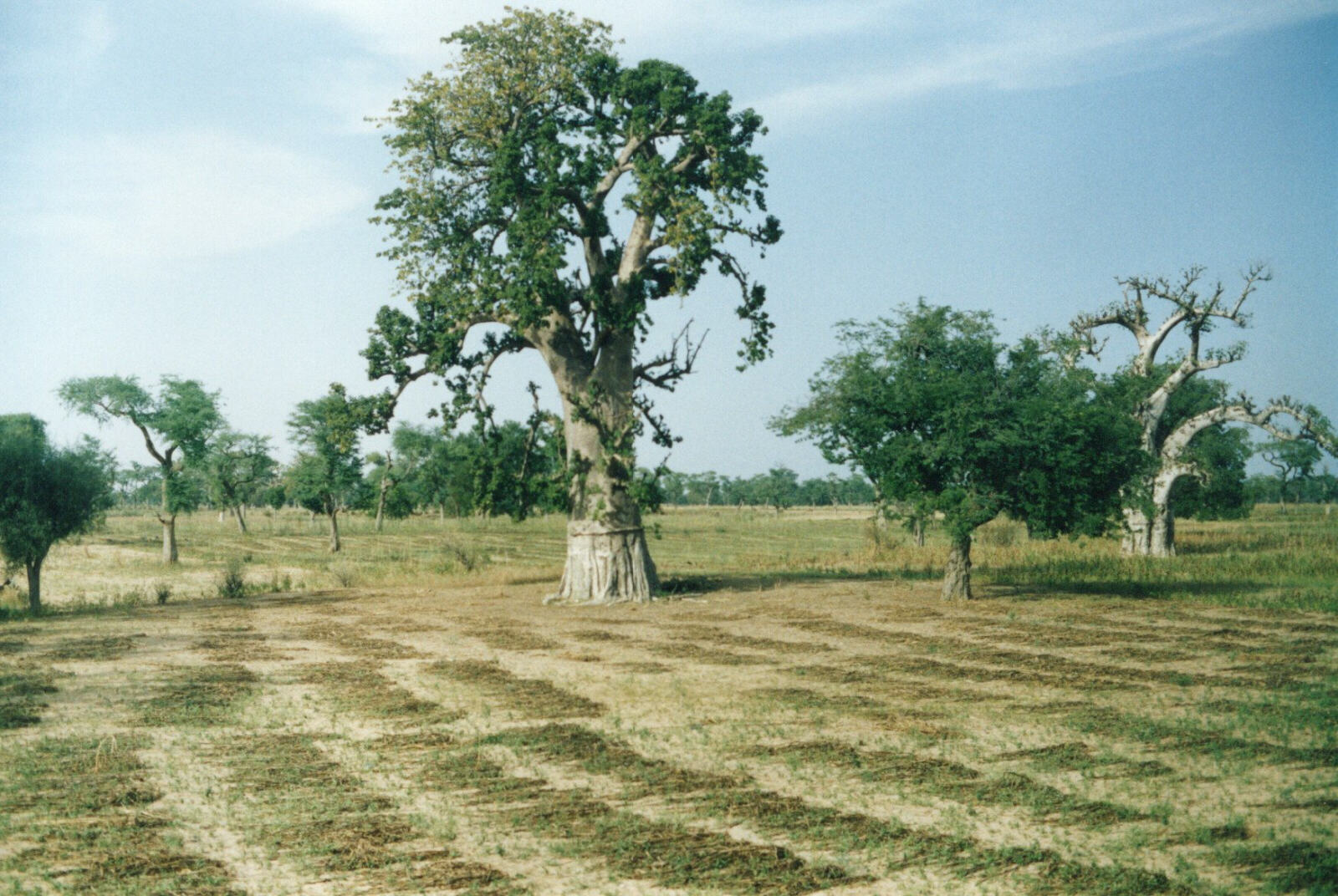
|
We passed the time by having slices of mango or cheese and biscuits. We realised that the Senegalese man had disappeared and his uncle was travelling alone, so for a while we spread out and had one of the bottom bunks for sitting and looking out of the window and the top bunks for lying down for a snooze. However, at an intermediate station the fourth passenger got on and claimed the other bottom bunk. Part of her luggage was a carrier bag of dried fish which made their presence felt in a rather pungent way, but we soon got used to it. When the restaurant car opened at 7pm we went and had dinner, a no-choice starter of prawn crackers with fried onions and main course a plate of tasty beef and onion stew for 1500 CFA (£1.60) each. After a couple of fizzy drinks and a coffee we returned to our couchettes replete. The air conditioning had been struggling a bit during the blazing heat of the day but now it was pleasantly cool and quite cosy.
Thurs 12th. We had a good night's sleep although it did get rather cold as the air conditioning took advantage of the fact that there was no sunshine to struggle against. Some time in the middle of the night an official came round collecting passports for the border crossing. At 9am we stopped in a small town called Kidira and there was a lot of to-ing and fro-ing. One of the passengers in a nearby compartment happened to mention that this is the border town and we had to go and collect our passports from the police post a couple of hundred yards away down a dusty track. There, they were calling out names and people in the crowd would reclaim their travel documents, but they called the ten or so non-Africans into a separate office and we had ours stamped personally. |
Mali - Bamako
|
Once everyone was back on the train we trundled slowly across a bridge over the Senegal river and stopped at the Mali border post. This was much quicker because the immigration officials got on the train and did the formalities as we went along. There was some sort of 1000 CFA (£1) entry fee but it seemed official so we didn't complain. Because we overslept we missed breakfast in the restaurant car so we had another picnic of mango slices and cheese and biscuits. We spent the day dozing and snacking as the endless flat African bush rolled past the window. In the afternoon the scenery was enlivened by some escarpments and a couple of wide rivers with small villages of round thatched huts made of mud-brick. As darkness fell we should have been in Bamako, capital of Mali and the end of the railway line, but it was clear that we were several hours away so we settled down on the bunks for another night's sleep.
Fri 13th. We arrived in Bamako at 4am, about 12 hours late. The cabin attendant said we could stay in the compartment if we liked and this seemed like a good idea so we settled back down in our bunks. A great silence descended. There was no train noise, the air conditioning was off and gradually all the other people either got off the train or went back to sleep. Pretty soon the only sound was the endless chirping of crickets in the African night.
We got up at 7 o'clock and decided to go straight to the hotel l'Amitié which the people in the next compartment in the train had recommended. It was a rather grim tower block from Mali's Russian period but was nice enough if a bit run down inside. They gave us a room on the top floor with a fabulous view of the river Niger flowing across in front of us. |
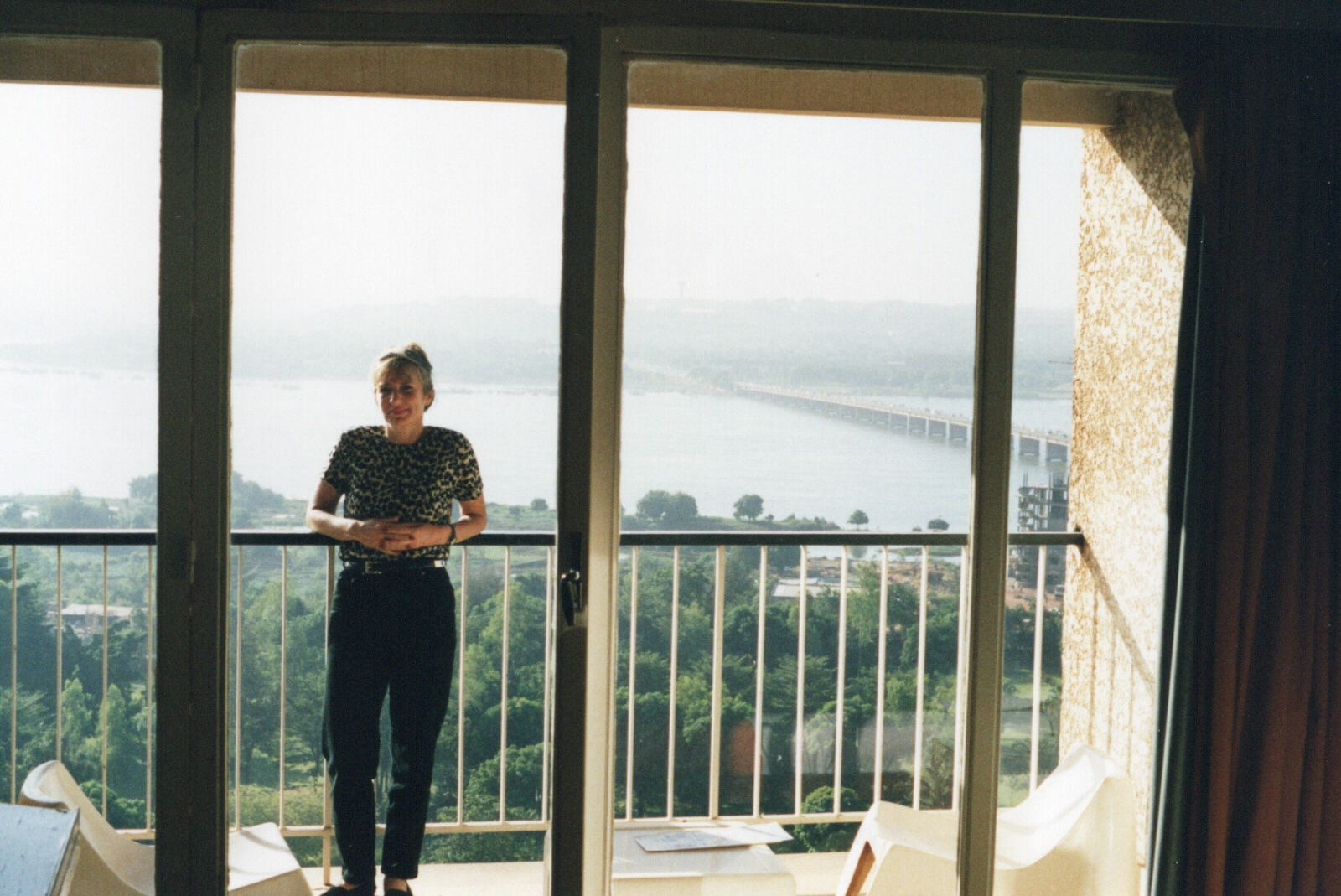
|
After freshening up we walked down to the Mali Navigation Company office to enquire about riverboats from Mopti to Timbuktu but didn't find out much except that the schedule is unpredictable. We'll just have to go to Mopti and see. We hadn't had any breakfast and although it was only 9am the heat was immense and we were exhausted so we got a taxi to the centre of town for a rather steep 1000 CFA (£1) and went to the Phoenicia Tea Room for breakfast. After a couple of omelettes and lots of tea and hot chocolate for 5000 CFA (£5.50) we felt fortified enough to set out for a tour of the market, which is a tightly-packed seething area of stalls and narrow passageways hardly wide enough for one person to walk through. It was all very colourful but most of the goods for sale were cheap plastic imports and copies of Western clothes. We went as far as the Post Office, a colonial-style building from about 1915 and posted some cards. We then hurried down to the bank and arrived just after it had closed so we couldn't change any money. This was not a disaster because Mali and Senegal (and most of French West Africa) use the same currency and we still had some left from Senegal. This makes travelling from country to country so much easier and roll on the euro, I say, or maybe we should just accept the inevitable and all use US$ now. Anyway, as we were leaving the bank we met a very nice Canadian couple called Richard and Fearon and went for a beer with them at the Phoenicia. They had come up from Ghana via Côte d'Ivoire; they were very well-travelled and a couple of years ago had been to Bhutan, which made me green with envy.
It was now 2pm and time for Sheila's sunbathe so we went back to the Amitié and sat by the pool for a couple of hours with occasional dips. About 4pm I went for another stroll round the market and stopped for tea and cake at a patisserie opposite the US embassy. At 7pm we met Richard and Fearon in the hotel lobby as arranged and went out for a meal. We chose the Salon de Thé Relax out of the guide book, which none of us had been to and it turned out to be excellent. The menu included everything from snacks and pizzas to fillet steak au poivre as well as having dozens of flavours of ice cream and a patisserie section. Sheila had steak in Roquefort cream sauce, I had Capitaine Provençal (Perch from the nearby river), a selection of sorbets to finish and a couple of beers along the way. Richard and Fearon had similar and it came to 24,000 CFA for the four of us (£26) - not bad for the wilds of Africa. A very pleasant evening.
Sat 14th. We were both suffering from colds courtesy of one of our fellow-travellers in the train so we had a quiet day in Bamako. We walked down to the Phoenicia for breakfast then sunbathed by the pool. At midday I had another walk round the market area and in the middle of the extensive street market found the new market hall with lots of neat little stalls and a nice open area in the middle. It was completely deserted and covered with dust, while the street market seethed on outside. Stopped for tea at yet another patisserie, de l'Ecole, and walked back to the hotel for another sunbathe by the pool.
In the evening we went back to the Salon de Thé Relax, eventually. The taxi driver got completely lost and started pointing to every restaurant we passed to try and persuade us that that was it. After a cooling beer we had a Lebanese-style dinner followed by four flavours of sorbet. Delicious. The taxi driver back not only knew the way but also didn't haggle about the price - a remarkable person. |
Mali - Ségou
|
Sun 15th. Up early, checked out of the hotel and got a taxi down to the bus station for the bus to Ségou, the next town 235 km down the river from Bamako. The system was quite organised once you understood it - you buy a ticket at the ticket office (2000CFA (£2) each, not bad for the distance) and they write your name on the stub. When the bus arrives they call out the names in order and you board, so first come first choice of seats. While we were waiting we got talking to four American Peace Corps volunteers who had just completed three weeks of training in Bamako and were now on their way to different remote villages for their two-year assignments, slightly wondering what they had got themselves into. The bus was comfortable with padded seats, lots of leg room and an attempt at air conditioning, but the window glass had completely frosted over so we couldn't see a thing outside. Some authorities said the bus trip would take three hours, some four. The bus left at 9:30 am and arrived in Ségou at 1pm, 3½ hours later. We immediately booked our ticket to Mopti for the next day. It appeared to be the same system - our name went on the ticket stub so we felt a reasonable chance of getting on the bus tomorrow.
Gritting our teeth for a serious haggle we flagged down a taxi to the hotel, but it turned out that all taxi rides in the town are 150 CFA (16p) per person, good value. The hotel we chose, l'Auberge, was a nice Colonialish travellers' favourite and it looked like we got the last free room. It didn't have air conditioning but there was a large fan on the ceiling and it was OK for 14,000 CFA (£15). We collapsed into the restaurant for lunch, still feeling hot and dusty from the bus ride and not having had any breakfast, then Sheila had a nap while I went for a walk. I went down to the Niger river-front where it was all happening. Men were loading cut grass from canoes onto donkey carts, other men were unloading sand from a canoe by shovelling it onto a big board and carrying it up the bank, countless women were washing clothes in the river, a man was washing his herd of goats and a party of tourists went out for a canoe trip on the river. I walked further up the river bank where there was more of the same, then came back to the town through the 'suburbs' - dirt streets of traditional Malian single-storey mud-brick houses where all the children wanted a 'cadeau' (present). |
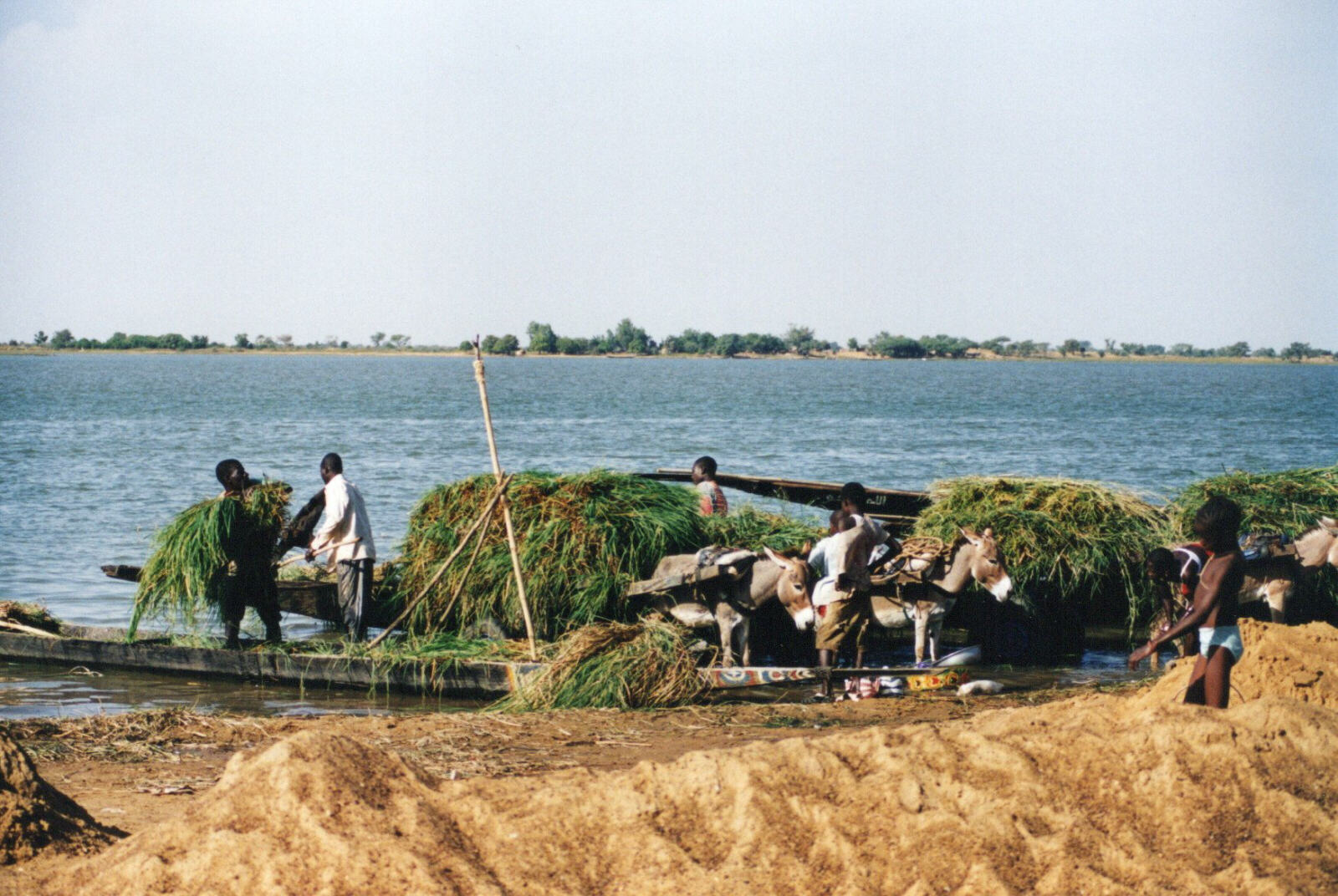
|
I stopped to top up the fluid levels with lemon tea at a restaurant which also sold Guinness! Walked round the town centre past the market, the mosque, down to the waterfront again and up to the other end where I had another refreshing tea at the Snack Bar Golfe, with a terrace overlooking a square which was an excellent place to watch the comings and goings of people, donkey carts, bullock carts, bicycles, mopeds and the occasional lorry (but no cars!). |
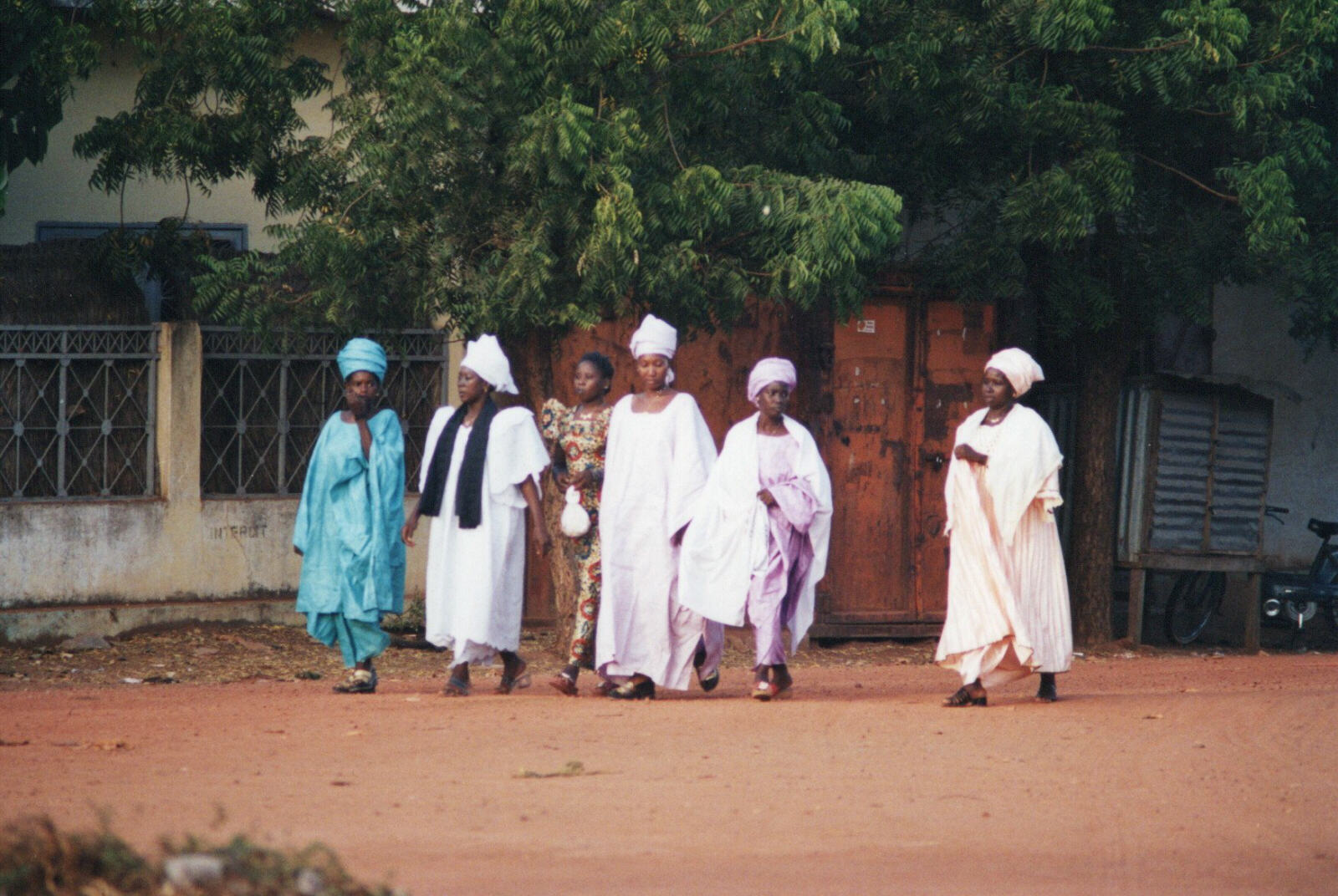
|
That evening we had a couple of beers and dinner in the open-air garden restaurant at the back of l'Auberge. The food wasn't as good as we'd expected but the atmosphere was wonderful, sitting in the cool of the evening under the sky full of stars, listening to the crickets chirping.
Mon 16th. We had breakfast in the shade of a tree in the hotel garden and got a taxi down to the bus station to wait for the bus to Mopti. The 10:30 bus left at 11:45 and our name was the first one called so we got the best seats, right at the front with a panoramic view of the scenery. The scenery turned out to be the same endless miles of flat, dusty African bush with occasional trees dotted about and low mud-brick villages with dusty fields of sorghum or sweetcorn and herds of goats or long-horned cattle wandering across the road here and there. The bus made good time along the excellent tarmac road and it was just after dark when we got to Sévaré, the 'suburb' of Mopti where the bus stops. |
Mali - Mopti
|
At l'Auberge the man had phoned and made reservations for us at a hotel called Campement Mankan-Té run by a German lady called Jutta, which he said was '50 yards from where the bus stops'. We got off the bus, asked directions and started walking accompanied by a swarm of 'guides'. It was actually well over 500 yards and we were even more hot and dusty when we finally got there than when we got off the bus. Jutta was very welcoming and spoke excellent English (as well as French, German, Italian and probably others). She had been living in Mopti for over five years and had designed and built the Mankan Té restaurant just down the road as well as the hotel. We all went down to the restaurant and had an excellent meal - I had ragout of mutton and green beans with garlic and Sheila had the Kofte kebabs.
Tues 17th. At last, a day of real sightseeing in Mopti. Everything up till now has felt like hard travelling, or recovering from it. We had an excellent breakfast on the veranda at the Mankan Té then got a taxi down to Mopti, which is actually on an island in the river and its surrounding flood-marshes, along the 12-km dyke built by the French. |
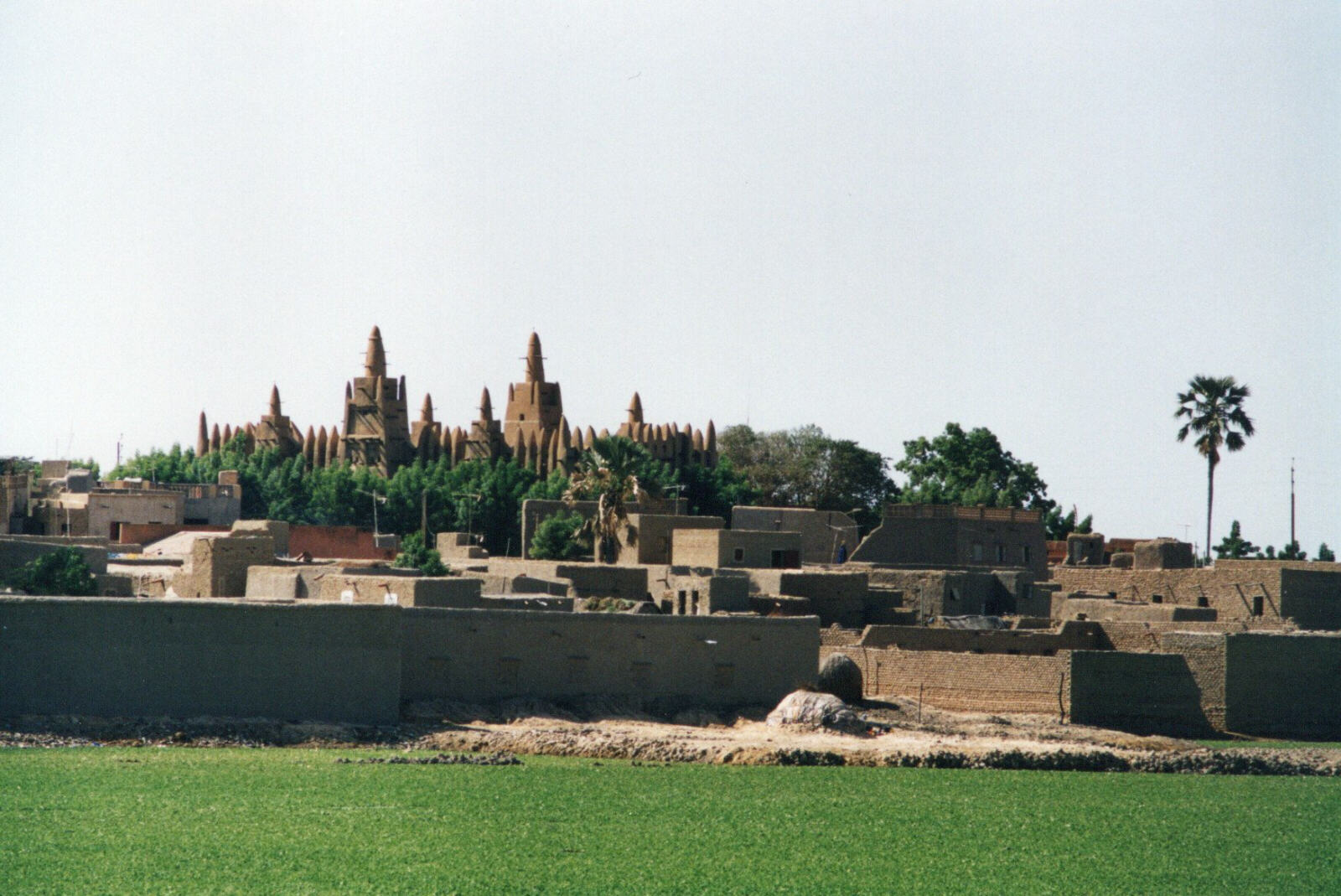
|
Jutta had phoned the CMN (Mali Navigation Company) and painstakingly booked a cabin on the riverboat to Timbuktu for us on Thursday, which was not easy because they just couldn't handle our names at all. The taxi (2500 CFA, £2.70) dropped us at the CMN offices so that we could pay for the boat. We had booked a 'deluxe' cabin for two rather than a first class with 4 berths, 2nd class with 12 berths or 3rd class which is find somewhere on deck if you can. There was a small hitch because they didn't take French francs and the cabin was expensive (109,000 CFA, £120) and I didn't have enough CFA. One of the men at the office, who had actually taken Jutta's call and, as it turned out, spoke reasonable English, had 'adopted' us and he took us down to a merchant in the bazaar who converted our FF to CFA at par (1:100) without taking any commission. We returned to the CMN office and paid the top man, who was friendly but didn't speak English.
All of this took some time and was punctuated by periods of sitting around or chatting in English or pidgin French depending on who it was. During the course of this we had mentioned that I wanted to find a barbers to get a haircut and Sheila wanted to buy an African lady's head dress, so the English-speaking man escorted us out and it became clear that he owned us for the day, if not for the rest of our lives. First he took us to the coiffeur - a man in a reed hut with a barber's chair where I had my hair cut extremely short to the delight of the local audience. The trip to find the head dress was not so successful and after wandering round the market being besieged by people selling cloth that Sheila didn't want we returned to the shipping office. There was then a lot of sitting around and not much happening until it became clear that our man wanted permission from his boss to stay with us for the whole day while we went sightseeing. At this point we made our excuses and left, preferring to walk around on our own.
It was not that easy, of course, and we were besieged by 'guides' all the way along the Niger riverfront, where there was a great hubbub of activity, with people loading and unloading boats and washing things, then further round by the fishing harbour an extensive market with lots of stalls selling what looked like fossilised fish skeletons. Luckily we still had the tail-end of our colds and couldn't smell anything. The two most persistent would-be guides were playing a game of good-guy bad-guy with us. One just wanted to help us, he was our friend, he wanted no money from us he just didn't want us to be pestered. The other one kept trying to get in the way when we took photos and shouted abuse and 'our friend' kept chasing him off. Eventually we asked a bystander to help us get rid of the bad guy and this seemed to work, so then we were just stuck with the good guy, who just wouldn't shut up - he kept up a constant babble about how he only wanted to help us and maybe we could just buy him a drink and so on and on….. We walked along the causeway that links the two 'islands' of Mopti into the old town and stopped to take photos of the impressive mud-brick Grand Mosque. |
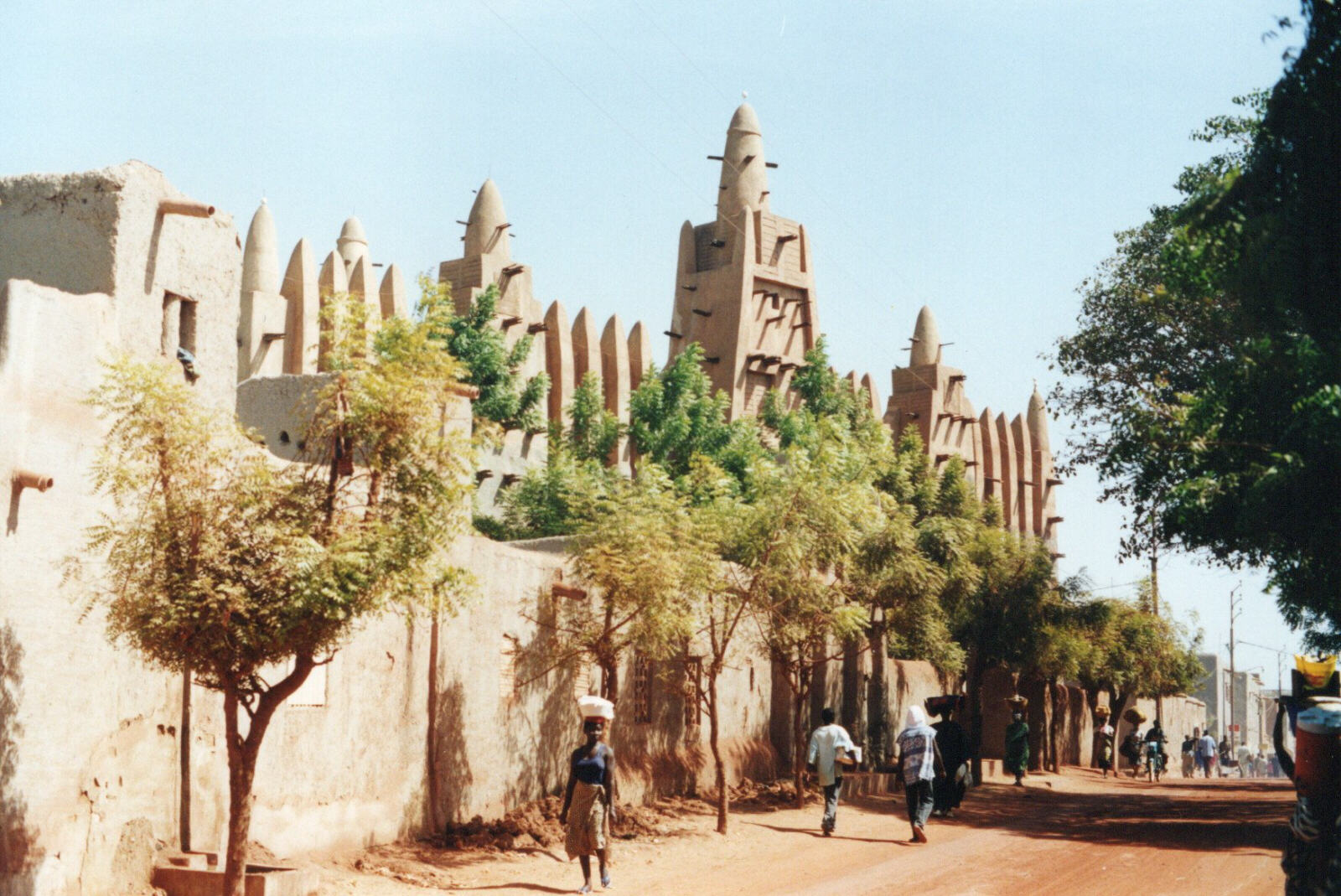
|
We pressed on down the dusty streets of the old town, between the mud-brick houses and the goat pens, down to the swamp's edge to see the cattle wallowing up to their horns in the bright green weeds. |
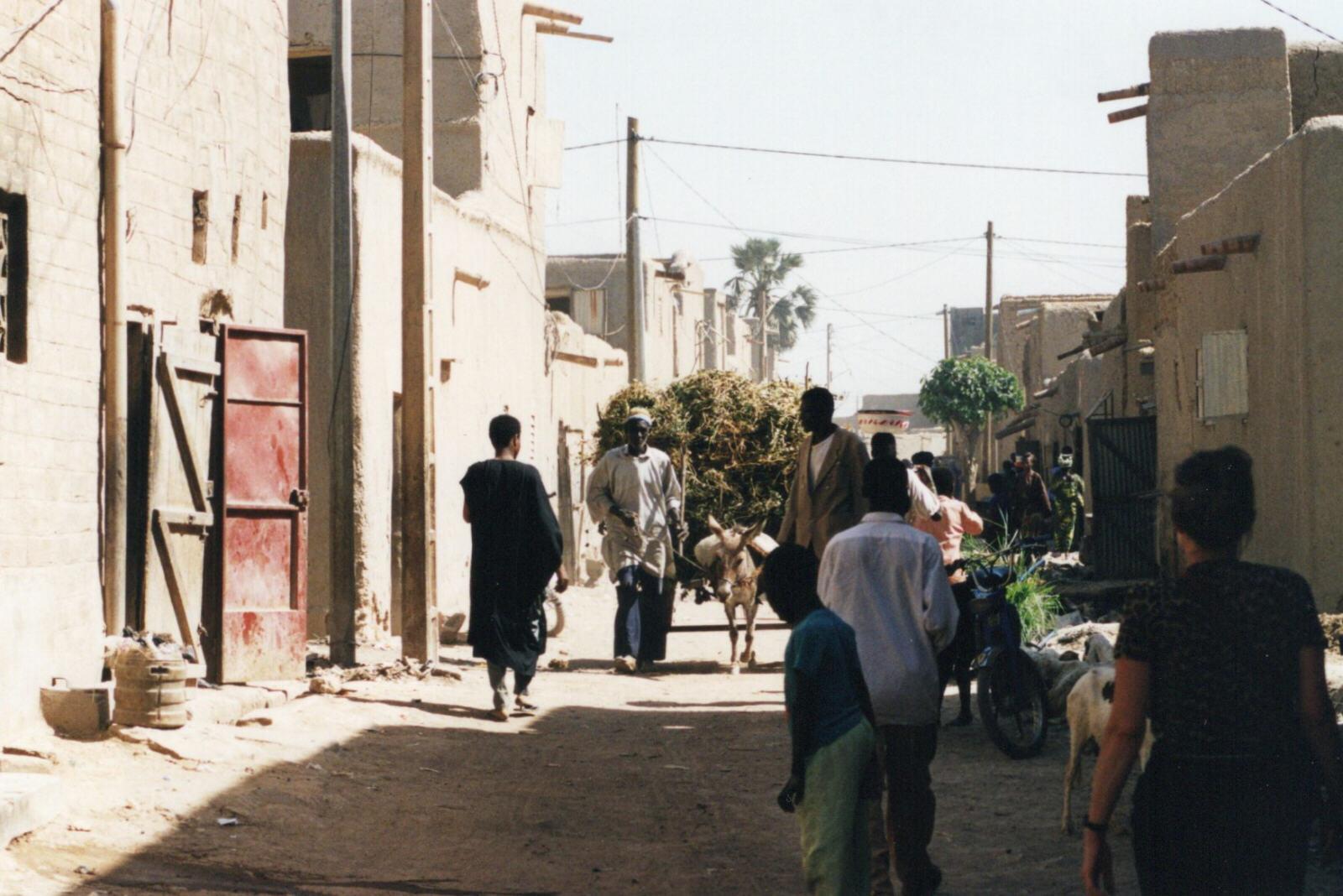
|
Eventually this got too much even for the good guy and he disappeared leaving us blissfully to ourselves. We walked down to the far end of the old town to the womens' market, which was the filthiest we had seen. As Sheila put it, I didn't know you could fit so many flies on a tomato. We stopped for a drink at the Bar Mali, a dark cavernous joint that seemed pitch black after the dazzling sunshine outside.
Refreshed, we walked back to the causeway and down to the far end of the harbour to the Bar Bozo, which has a terrace in a wonderful location overlooking the boats coming and going and loading and unloading on one side and the broad sweep of the river with canoes and boats paddling and sailing by on the other. Unfortunately the service is lousy and the prices are high but the location is worth it and we came back here many times. |
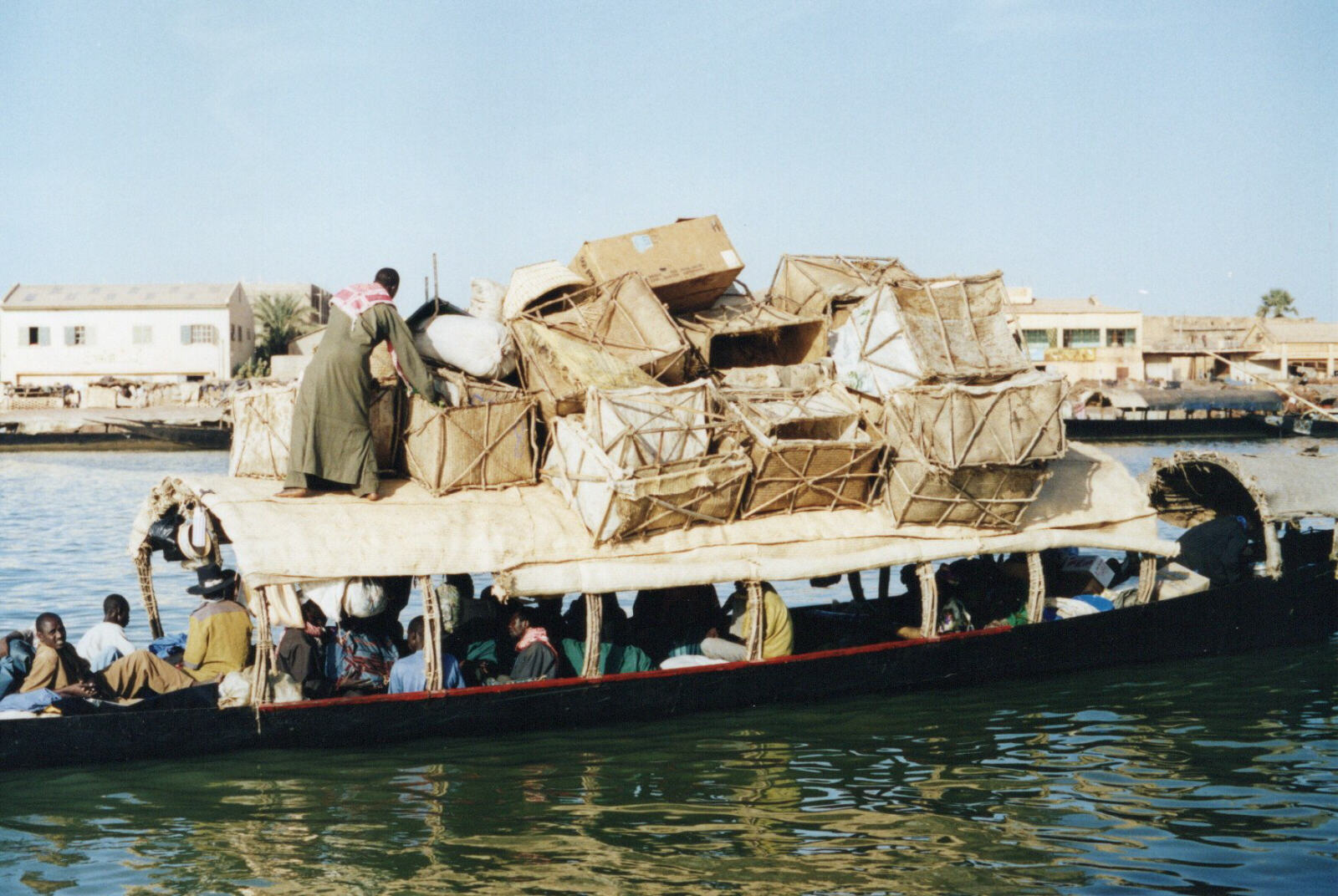
|
We got talking to a Dutch couple there who told us about a scam we hadn't heard of before. When they flew into Dakar the immigration man didn't stamp their passports, but they didn't notice. The next day they were just sitting in a café in the town when a police car pulled up and the police demanded to see their passports. A long rigmarole ensued involving lots of hassle, lots of wasted time and lots of money changing hands. We'll have to watch out for that one.
We walked back through the market area to the Post Office but it was closed and there were no postcards on sale nearby so, as dusk was approaching we decided to call it a day. We went to the Gare Routière (a dusty patch with taxis, buses and trucks) and rather than pay 2500 for a taxi we got the shared bus to Sévaré for 150 (16p) each. These are little open-sided vans with bench seats round the edge and just room for the spare tyre on the floor in the middle. They cram in more people than you can imagine and then a few more, but we were the first on so we defended our spaces and it was quite comfortable considering.
|
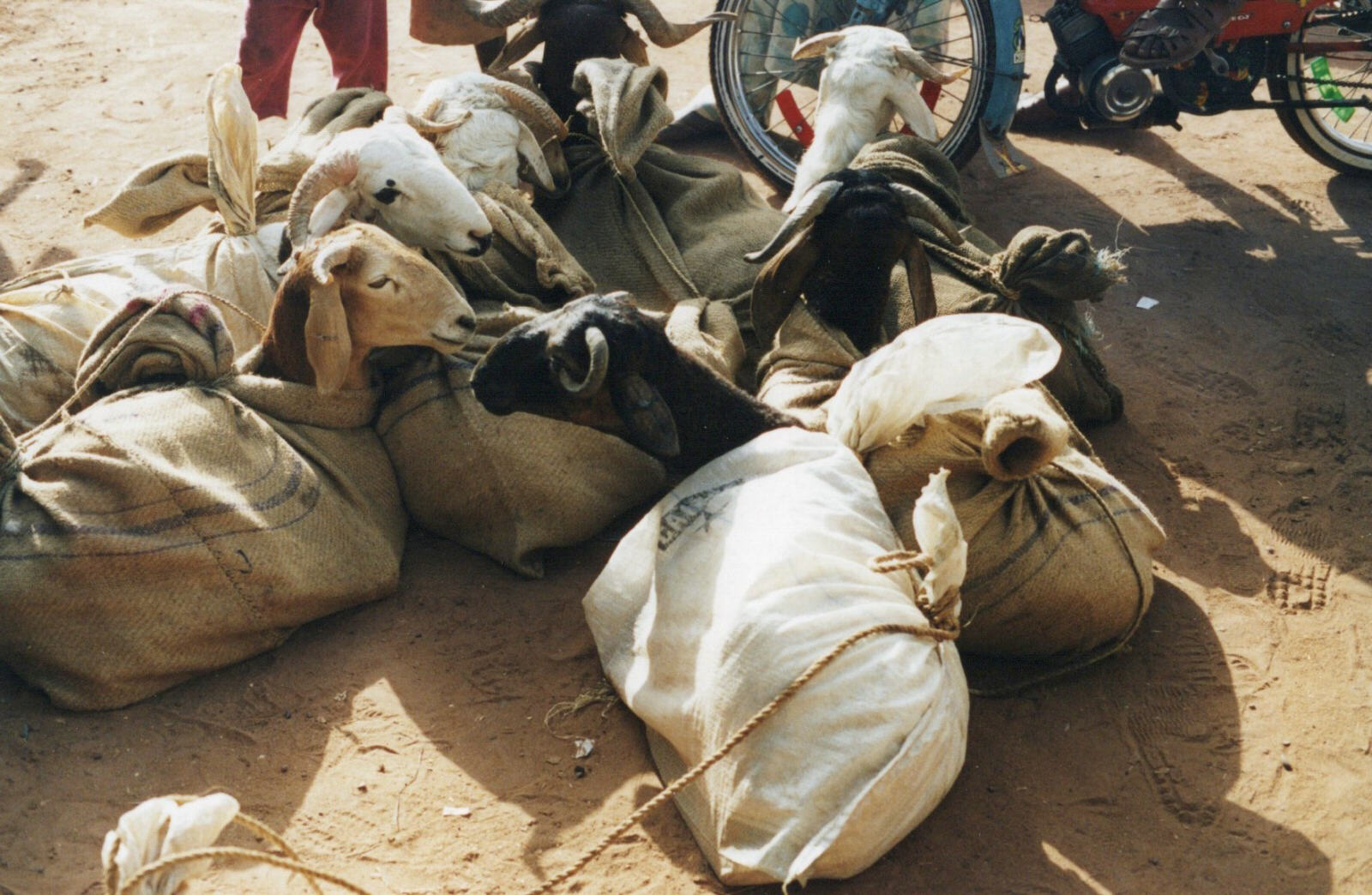
|
Walking through Sévaré towards the hotel we bumped into Cathy, one of the Peace Corps volunteers we had met in Bamako! The other three had departed for their far-flung destinations and she was leaving tomorrow. We stopped at the restaurant for a beer, which was luke-warm because the electricity had been off for five hours. Apparently this is the norm and yesterday, when it was on all day, was the exception. We went back to the hotel and showered by candlelight then back to the restaurant for a candlelit dinner. We both had the ragout of mutton which was really good and the meat was tender, except mine seemed to have lots of pieces of bone in it, until I realised that one of my teeth had disintegrated and it was bits of filling. It didn't seem to hurt and although it was rather worrying it didn't give me any trouble for the rest of the holiday. Back at the hotel the electricity was still off so we went to bed and lay sweltering in the heat. Then, in the middle of the night a rushing noise started like a great wind in the distance, sweeping up and over us - it was the ceiling fans starting up - the power was back on! |
Mali - Djenné
|
Wed 18th. We opted for a guided tour today, which Jutta arranged for us; a taxi and driver for the day to go to Djenné, a picturesque medieval mud-brick town about 130km from Mopti. For 40,000 CFA (£45) we thought we would be paying for the simple, hassle-free option but of course it wasn't that easy. First we stopped for petrol (he hadn't filled up before picking us up because he hadn't enough money so I paid for the petrol out of the hire fee). The petrol gauge obviously wasn't working because the driver checked the level with a dipstick before filling up! Then we set off for Djenné, but only got as far as the checkpoint on the outskirts of Sévaré where a sour-faced policeman wouldn't let us through because we hadn't had our passports stamped at the Commissariat in Mopti. So we had to go all the way back through Sévaré to Mopti itself, fill in a form, pay 1000 CFA each and return to the checkpoint. Finally we were through and on our way, only an hour or two late.
The drive was through the standard African bush, flat and unchanging, past large herds of cattle where flocks of white birds took off as we passed (there was hardly any other traffic on the road) and one group of vultures was getting stuck into a dead donkey. There were huge termite mounds as big as a small house, but these are only the tip of the iceberg - I understand that most of a termites' nest is underground. We got to the river Bani and crossed on an ancient motor ferry which had a deck with room for two cars, railings down each side and four souvenir stalls. |
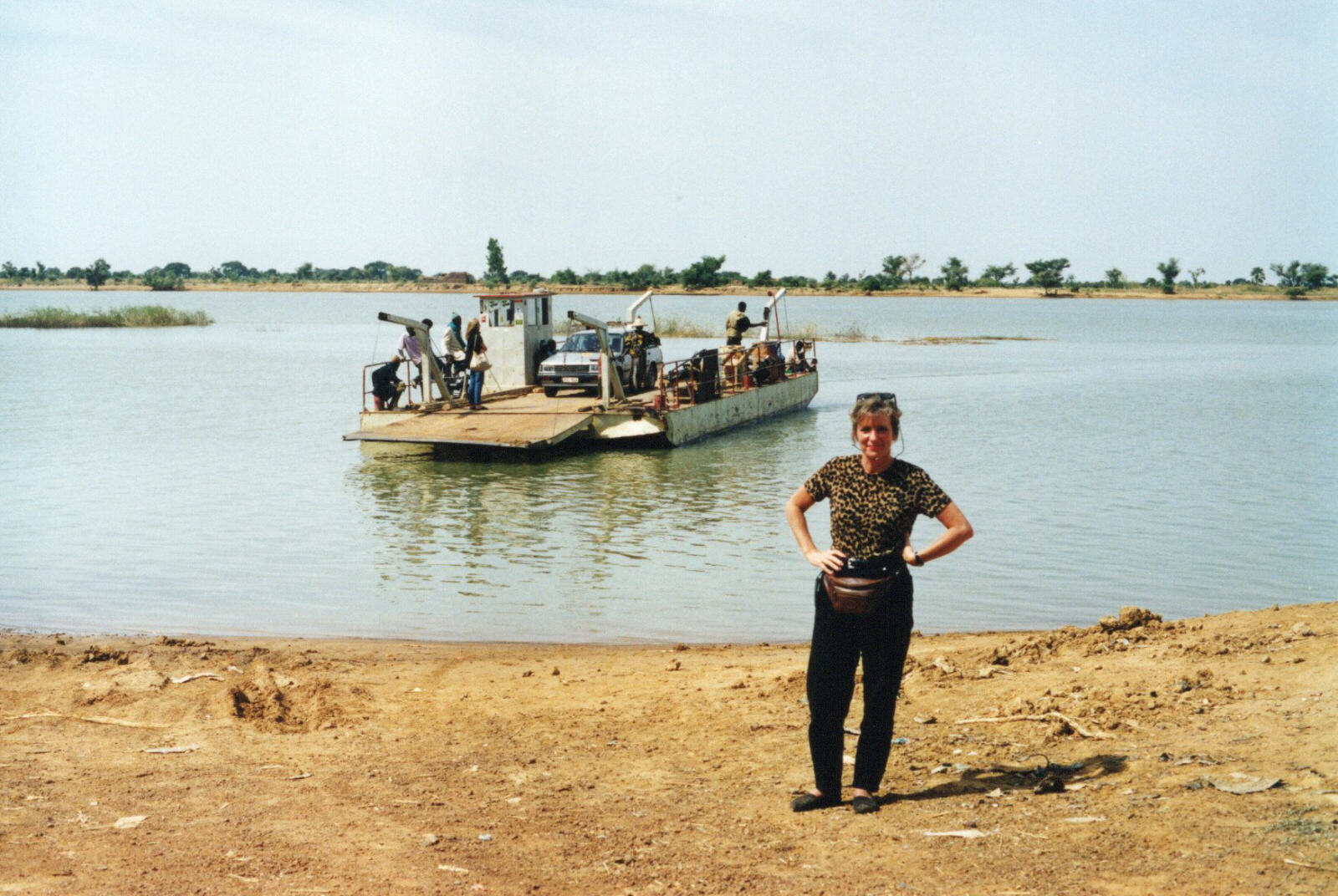
|
On the other side of the river there is a dirt road the short distance into Djenné, where we first stopped in a cool, airy café for a cold drink. Then the problem of a guide arose. We had assumed that the trip was all-inclusive but oh no, the driver's recommended guide wanted 7000 CFA (£7.50). Our driver was a very cheerful, friendly chap but didn't speak any English. A nice fellow called Amadou joined in the conversation to persuade us a guide was necessary and, to cut a long story short, because his English was so much better than the recommended guide's, we settled for him as a guide instead for 3000 CFA (£3.30).
Djenné. First we went through the market place, empty today because it's not market day, to the Great Mosque, which is the one you see on all the posters and in all the guide books. It was most impressive, a huge mud-brick structure with ornamental doors and decorative beams sticking out of the towers at the corners and centres of each façade. |
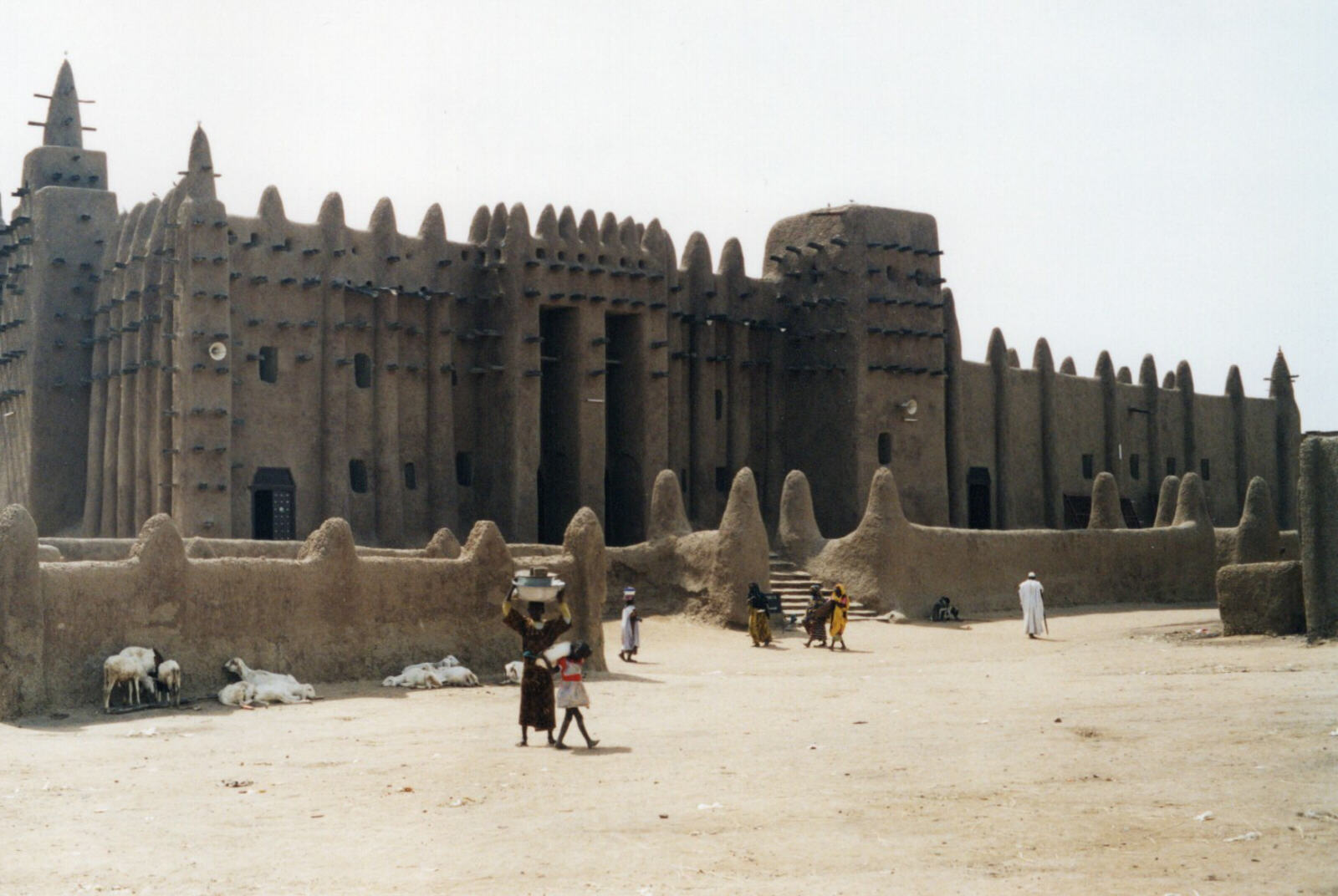
|
We took photos from all angles, but weren't allowed to go inside. |
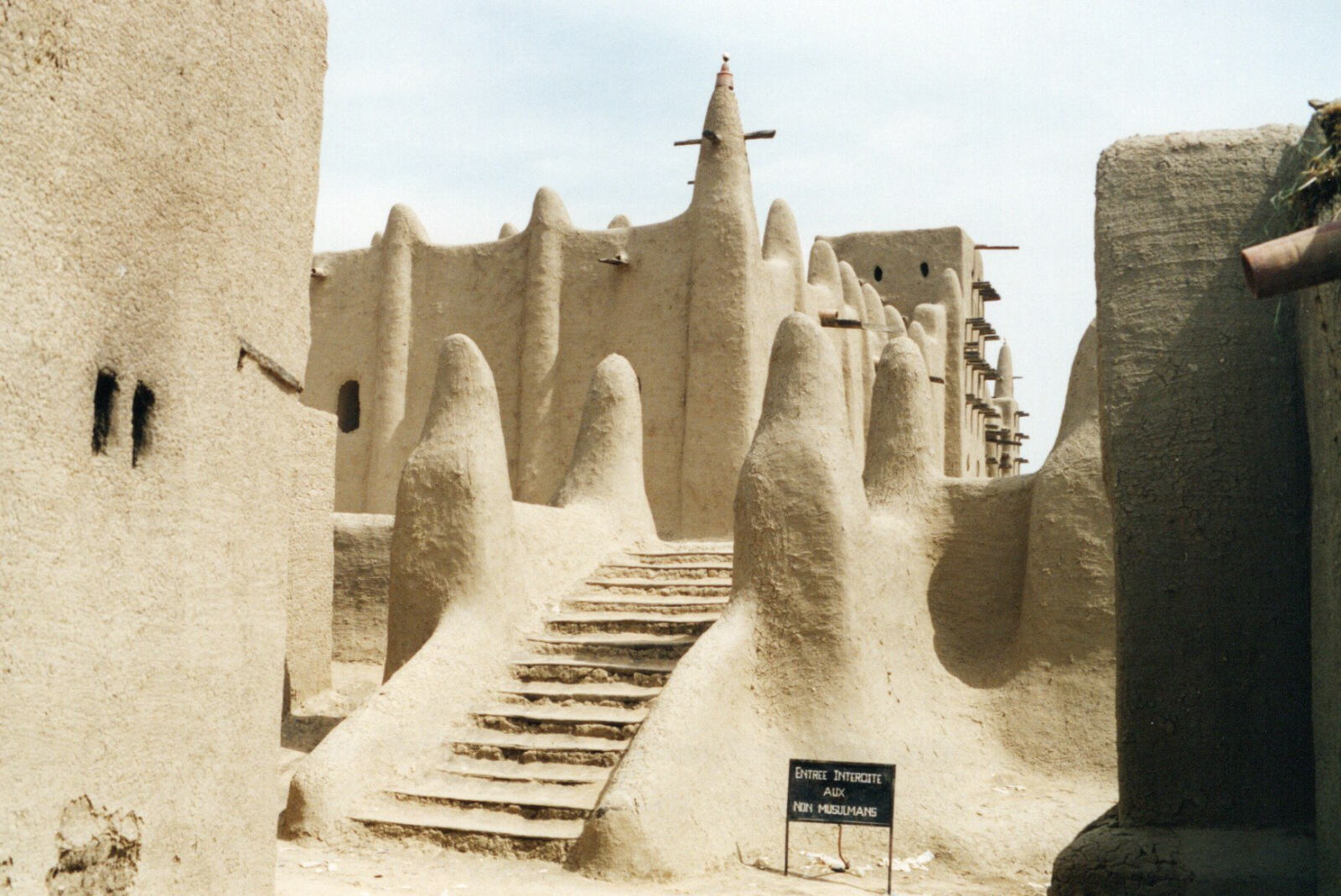
|
Then we walked around the old town for some time which was extremely pleasant. Amadou explained occasional interesting things along the way and the rest of the time just let us go at our own pace, digressing down side alleys if we wanted to. The old town is a mass of higgledy piggledy dirt alleyways between mud-brick houses, opening up into occasional squares with a tree, a donkey cart, a water pump and a few people sitting in the shade. Amadou explained that what we thought were open cess pits by the side of the street were actually mud pools with the raw material for making bricks. |
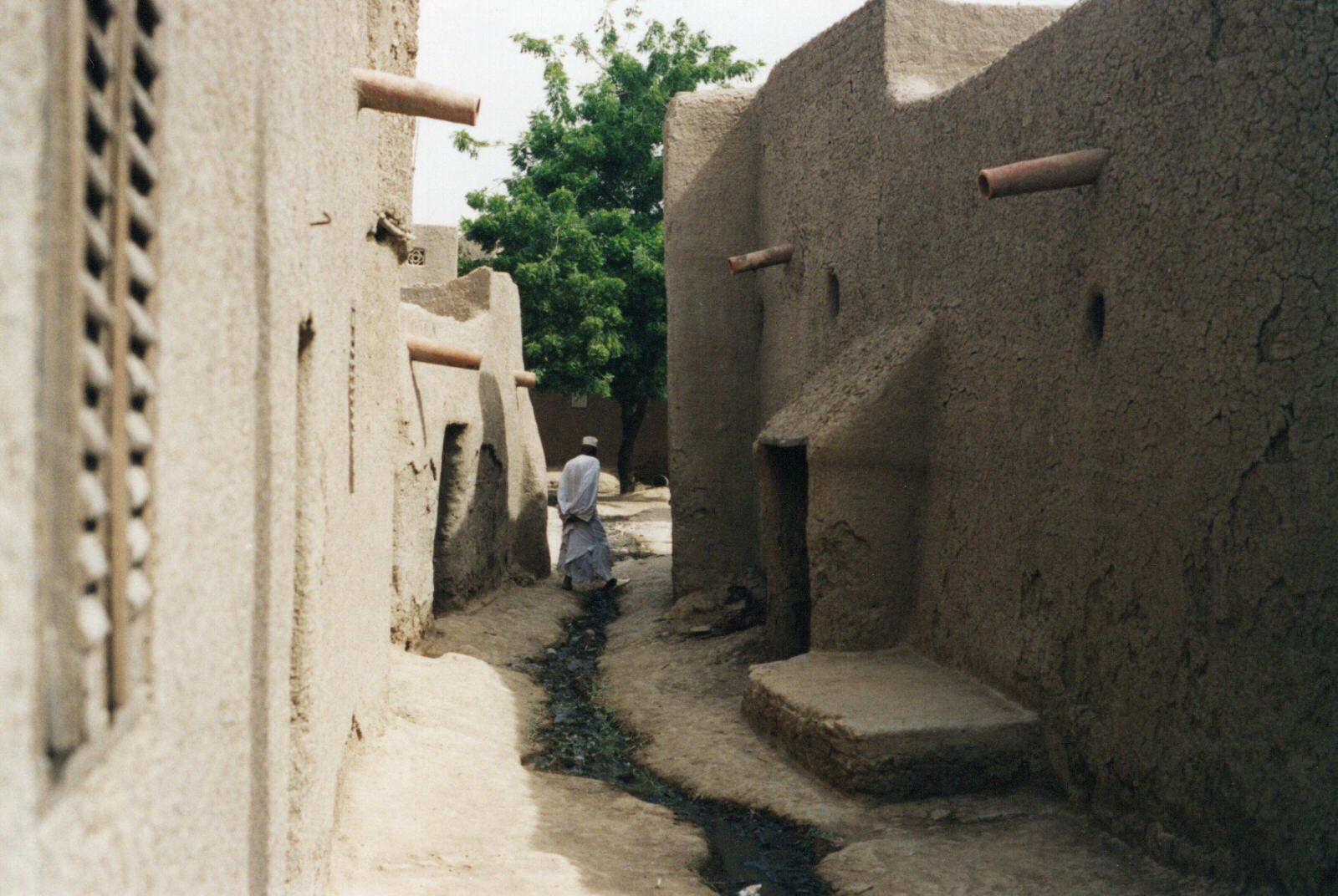
|
He took us up onto the roof terraces of two houses, one near the Great Mosque with superb views across the square towards it and the other at the far side of town looking across the rooftops to the river and marshes that surround the town. As we were coming downstairs from the second rooftop terrace we stopped to look in a local handicraft studio in the same building and there was Cathy, the Peace Corps volunteer we met in Sévaré and Bamako. She had just moved into her home for the next two years in Djenné - there was no electricity and hardly any furniture but the owner had cleaned and painted it since she first saw it so it was a bit more attractive. She was now developing a long shopping list of necessities she was going to buy, starting with food, through pots and pans to a bit more furniture!
We returned to the café where our driver was waiting and had a very welcome cold drink. It had been an excellent, interesting and hassle-free tour and we told Amadou he was the best guide in Mali! The ferry crossing and drive back to Sévaré were uneventful except for one stop for the driver to buy several bundles of firewood and load them onto the roof of the taxi. |
Mopti again
|
For the third night running we showered away the dust and heat and went to the same restaurant for the same beer and ragout of mutton. As we were halfway through our meal, Richard and Fearon who we last saw at the Relax in Bamako, walked in out of the blue! Well, out of the starry African night. They had been for a four-day trek in the Dogon area of Mali and had arrived in Mopti that day. We had a pleasant chat but unfortunately Sheila started to feel unwell and we had to leave.
Thurs 19th. Sheila had some sort of 12-hour bug. She was quite ill yesterday evening, then slept deeply till 10am while I had a leisurely breakfast and a read. Once she got up and got going she started to feel better and we met up with Richard and Fearon who had moved into the Mankan Te, our hotel, because theirs was terrible. Today's task was to change some money and this took most of the morning. We walked down the road with Richard and Fearon, flagging down any vehicle that came past in the hope that it was a taxi. Almost straight away a chap driving a smart, clean 4WD vehicle with air conditioning stopped and offered us a lift. He appeared to work for one of the aid agencies and he really didn't want to take any money, which was nice of him. He dropped us at the bank in Mopti and we went in to start the labourious process of converting FF cash into CFA cash. Because the rates are fixed we didn't have to pay commission but there was still endless form-filling and so on.
Having achieved our purpose we went sightseeing in Mopti, punctuated with cold drinks and beers at the Sigui restaurant, on the waterfront at one end of town, and at the Bar Bozo by the harbour at the other. |
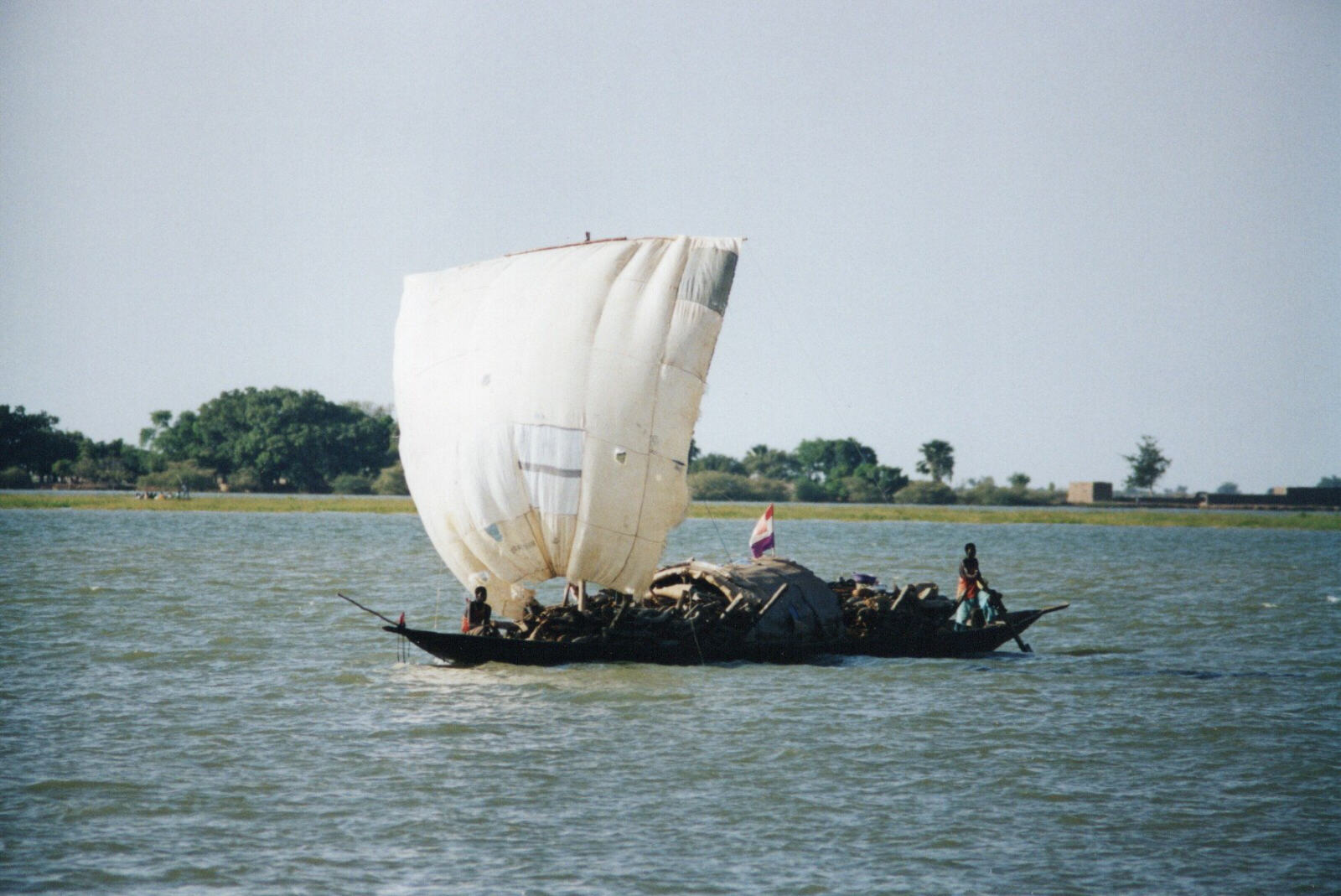
|
Along the way we found the post office open and some postcards for sale inside (there didn't seem to be any anywhere else in Mopti) and we looked around the small but colourful market. |
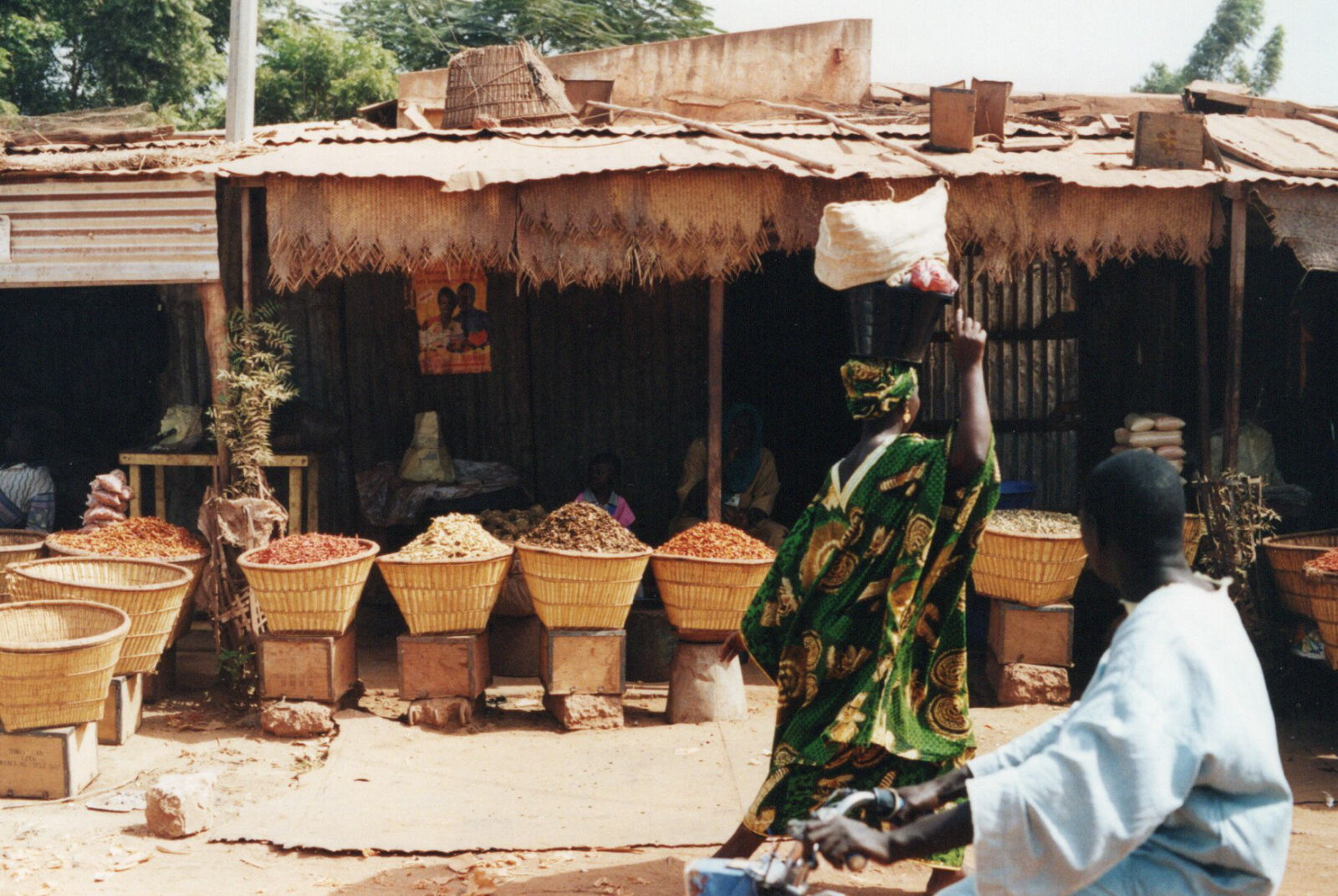
|
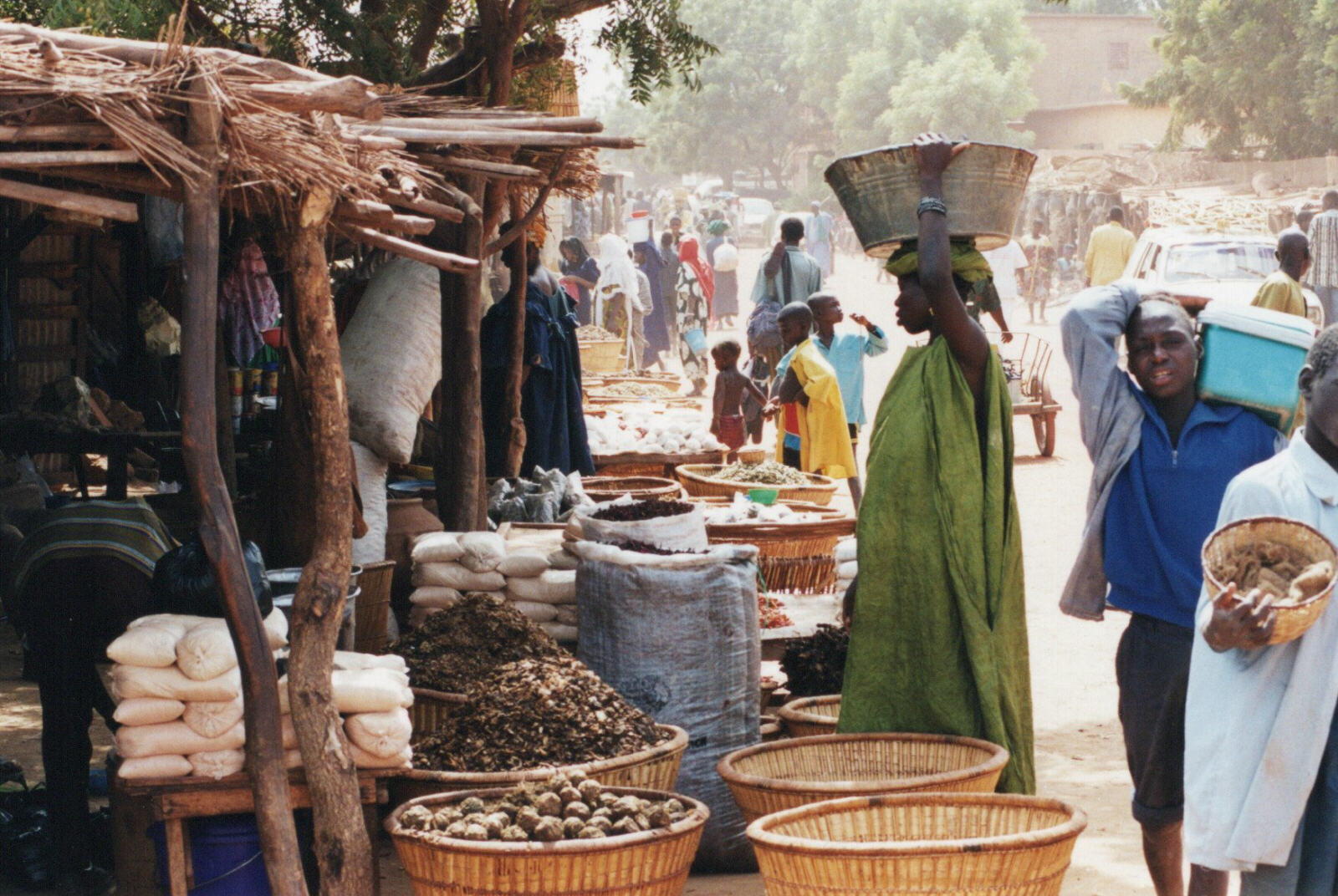
|
At the appointed time of 4 o'clock Sheila and I went to the Navigation office to see if the boat to Timbuktu was there. The good news was that the boat was there, moored opposite the office. The bad news, we found out inside, was that the engine needed repairs and it wasn't going to leave till Saturday! This messed up our planned timetable somewhat, but we had heard horrendous stories of delays and breakdowns so we weren't totally surprised. They took us on the boat and showed us our cabin, which looked really nice. There were three decks and the first class cabins and restaurant were on the top, with cool breezes off the river. The cabin had air conditioning, a fridge and en-suite bathroom. As the attendant pointed out each item Sheila asked 'does it work' and he said 'oh yes'. We shall see.
We met Richard and Fearon for another beer as arranged and walking back to the bus station stopped at the Air Mali office to enquire about flights out of Timbuktu. There we got the alarming news that Air Mali doesn't take credit cards at all, so we've got to change a pile more money at the bank if we don't want to spend the rest of our lives in Timbuktu. We came back to Sévaré packed into the little truck/bus with a representative cross-section of local humanity. Exhausted, we had a beer and a meal at the Mankan Té. When we ordered, Fearon just enquired whether the banana flambé on the sweets menu was available and they confirmed it was. Soon after we had finished our main courses, out came four plates of blazing bananas! They burned very prettily and there was still plenty of rum (or whatever it was) left when the flames had gone out.
Fri 20th. Richard and Fearon had (presumably) left early as planned to fly back to Ghana. Over breakfast we chatted to a Spanish couple who appeared to be the only other people left in the hotel. They were part of a tour group, the rest of which was staying elsewhere, and when we realised that they were going into Mopti in two 4WD's to pick up the others we cadged a lift. We went to the BIM bank to change all our travellers' cheques into cash. This was more straightforward and quicker than I expected, only taking half an hour or so. I think my expectations are beginning to adjust to the local reality.
Being at the north end of town we walked up the riverside road to the Kanaga, Mopti's only 'luxury' hotel about a km out of town. It was more expensive (32,000 CFA (£35) room-only compared to Mankan Té's 20,000 CFA (£22) bandb) but it had the huge, unexpected advantage that it took credit cards. As we were adopting a totally short-term view of money at this stage (scrape together enough cash to get out of here and worry about the bills when we get home) we decided on the spot to move there for tonight. It is also comparatively close to where the riverboat is moored so if we ever do get word that the boat is leaving we will be better placed to move on board. We rushed back to the Mankan Té, packed, said goodbye to Jutta, Bobo her assistant and the other staff, and moved into the Kanaga. The Kanaga could be really nice but it is undergoing some renovation. There is a swimming pool with no water and a rough dusty area round it that might one day be a pleasant garden. The place has a strange smell, a sort of combination of new building and old dust. It was midday and Sheila crashed out for a nap while I read a book in the hotel lobby. Later we went out in search of a supermarket to stock up with provisions for the boat trip, but despite getting precise directions several times to several different places we never quite found any of them. Eventually we ended up back at Bar Bozo to watch the boats coming and going and had a nice lunch/dinner of onion soup and beef brochettes.
|
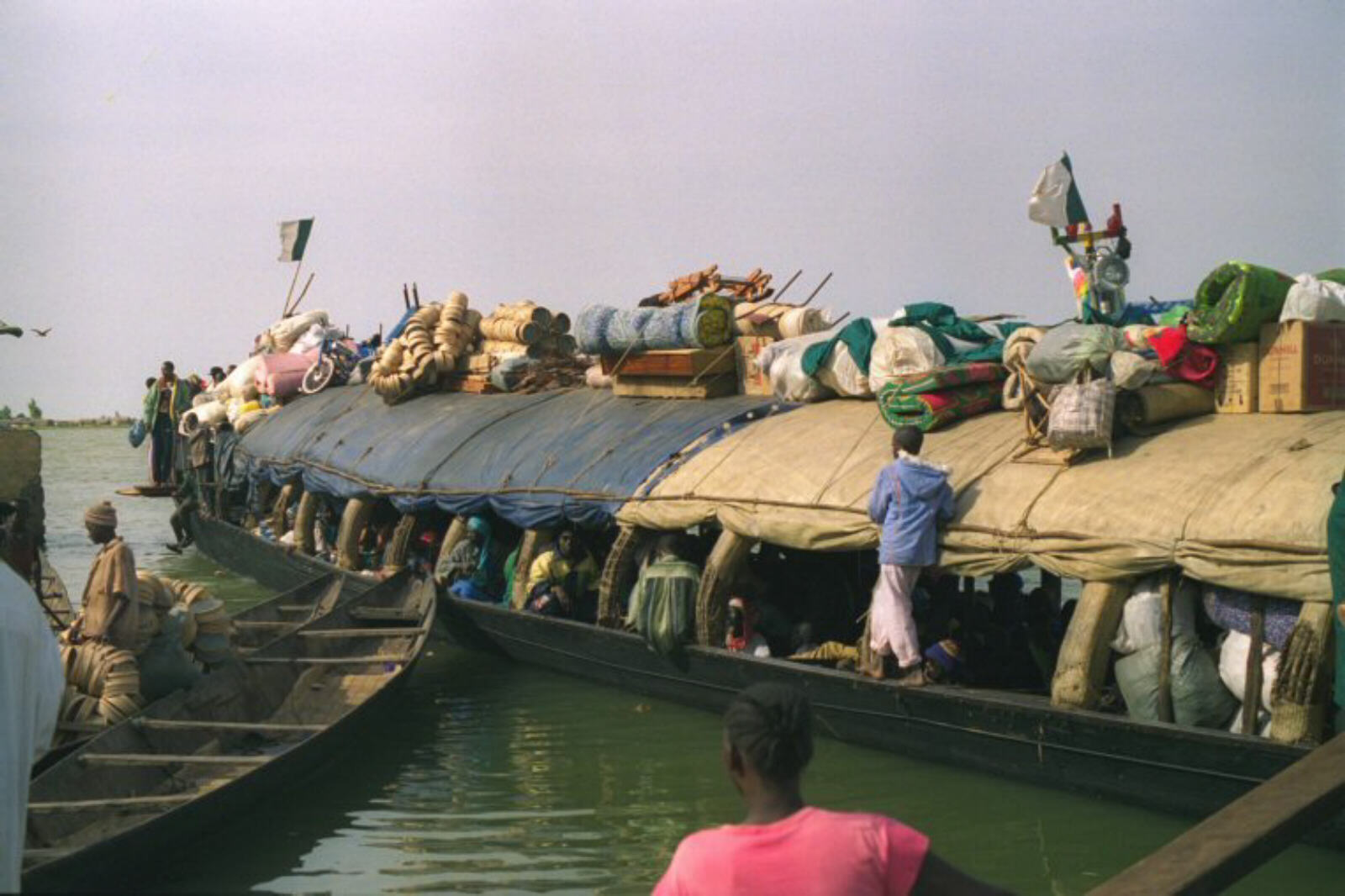
|
Even though we're really only hanging around waiting for the boat we end up hot and exhausted each day and we went to bed early while there was still power to drive the air conditioning. Some time in the middle of the night it went off but the room was reasonably cool by then.
Sat 21st. The hotel breakfast was very poor value and not included in the room price so we skipped it and walked down the riverside road to the Navigation office where they issued our tickets for the riverboat. Amazingly these were computer-produced and personalised with our names printed on. A row of about 8 tickets was printed onto an A4 sheet of light cardboard, which the manager cut up with a pair of scissors. We went to the Sigui restaurant for breakfast and had a nice Spanish omelette and bread and jam while we watched the lizards and little red birds come to drink from a nearby dripping tap. Then we had another attempt to find the supermarket. We asked the waiter who without hesitation deserted his post to come and show us the way, accompanied by a hanger-on who kept trying to muscle in and take us to his shop. They hadn't quite got the idea, though, because we ended up going round the craft and souvenir market, so with lots of help from the phrase book we explained what we wanted and they took us to the shop of the man who had changed our money the day we booked the boat tickets. I had been trying without success to find his shop again because he had all the things we needed - bug spray, a bit of food in case the food on the boat was inedible, tea bags, bottles of water, etc. We came away fully equipped for our expedition and returned to the hotel.
|
Niger Riverboat to Timbuktu
|
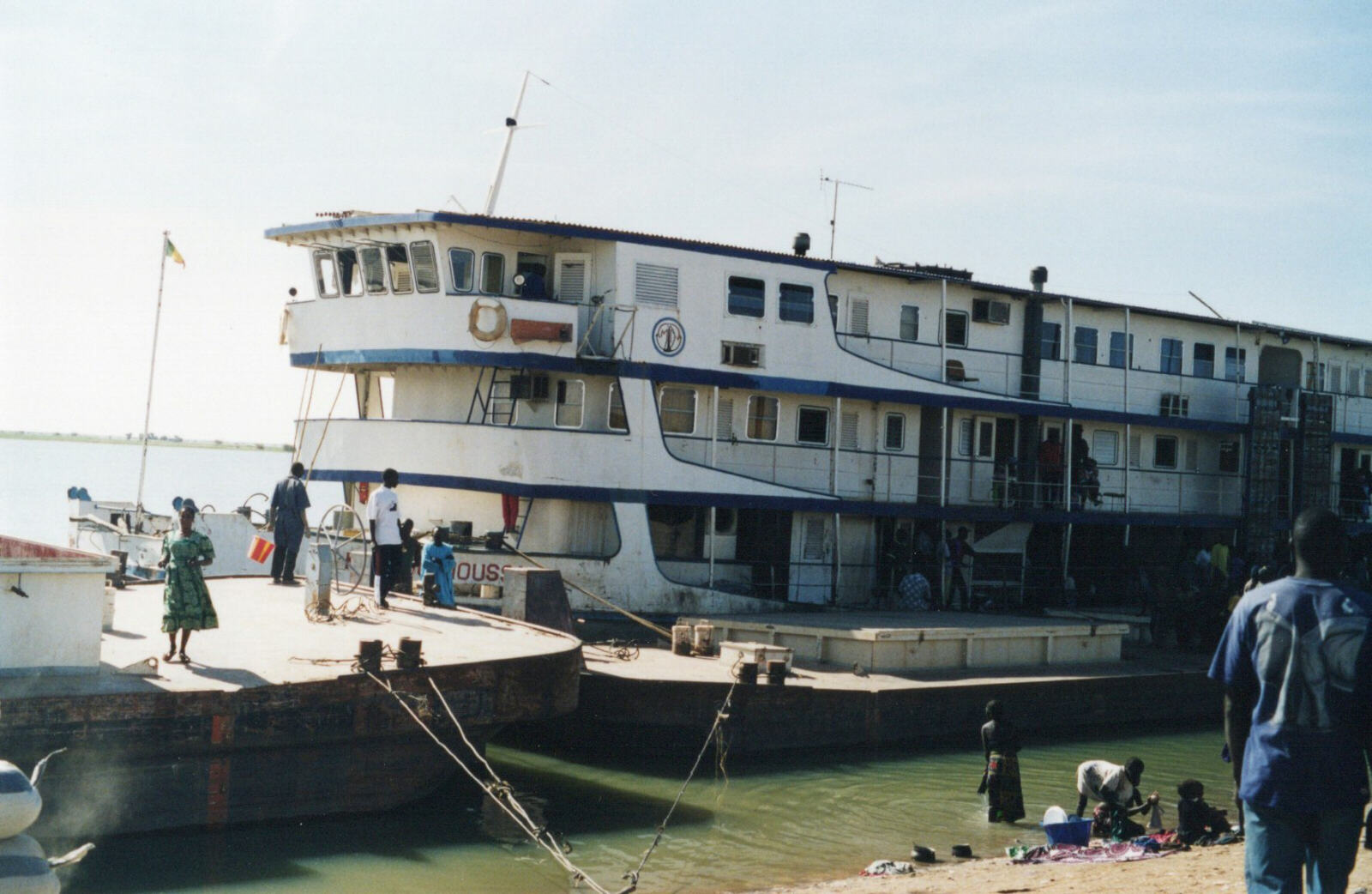
|
We read and dozed until about 3:30 then walked down the riverbank road to the boat and took occupancy of our cabin. First we made it habitable - this involved asking one of the crew to wipe all the sticky surfaces with a cloth and another one to sweep all the bits and pieces off the floor, then we used most of a can of bug spray, closed it up and went to the quayside to watch the hustle and bustle of preparations. We discovered that, although all meals are included in the price of the ticket, that starts with breakfast tomorrow and not tonight's dinner, so we went across the road to the Sigui and Sheila had a superb beef curry while I had a similarly excellent brochette of Capitaine.
The advertised departure time of 8pm was now approaching so we returned to the boat, saying goodbye to Hamadou, the man from the boat office who had originally made our reservation. At about 8:30 we were standing on the top deck when we noticed that the boat was ever so slowly starting to drift away from the quayside at one end. Very gradually it swung out into the river, lazily turned around and we were off! The cabin was now very cosy and everything worked as promised; fridge, a/c, running water, etc. We settled in feeling quite at home as the boat chugged its way down the Niger river.
Sun 22nd. We have now been going for exactly two weeks and here we are steaming down the Niger river in the morning sunshine. |
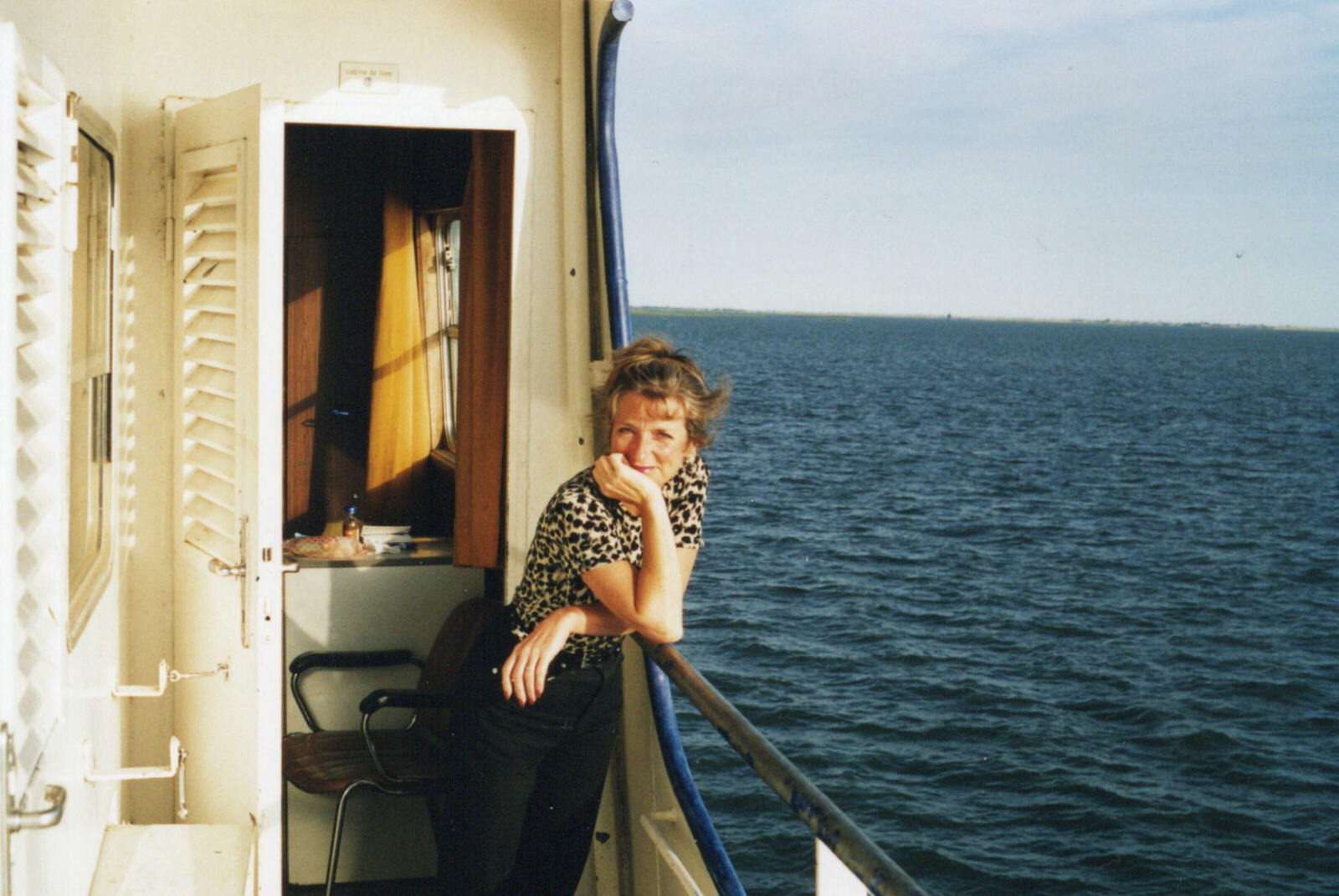
|
The river is vast, it's more like an inland sea. The land on either side is totally flat, so all you can see is water up to the horizon where there is a greenish line which may be land or floating weed. We seem to gently weave our way from side to side of the channel following some path that only the Captain knows (I hope) and as we get nearer to one of the banks it resolves itself into two thicker lines, a yellow sandy one underneath a green bushy one. There is no sign of agriculture or irrigation or any sort of activity on the bank. At other times we sail quite close to huge beds of reeds that all but clog up the river. Very occasionally there are little fishing villages that are so close to the river that they seem to be floating on it. |
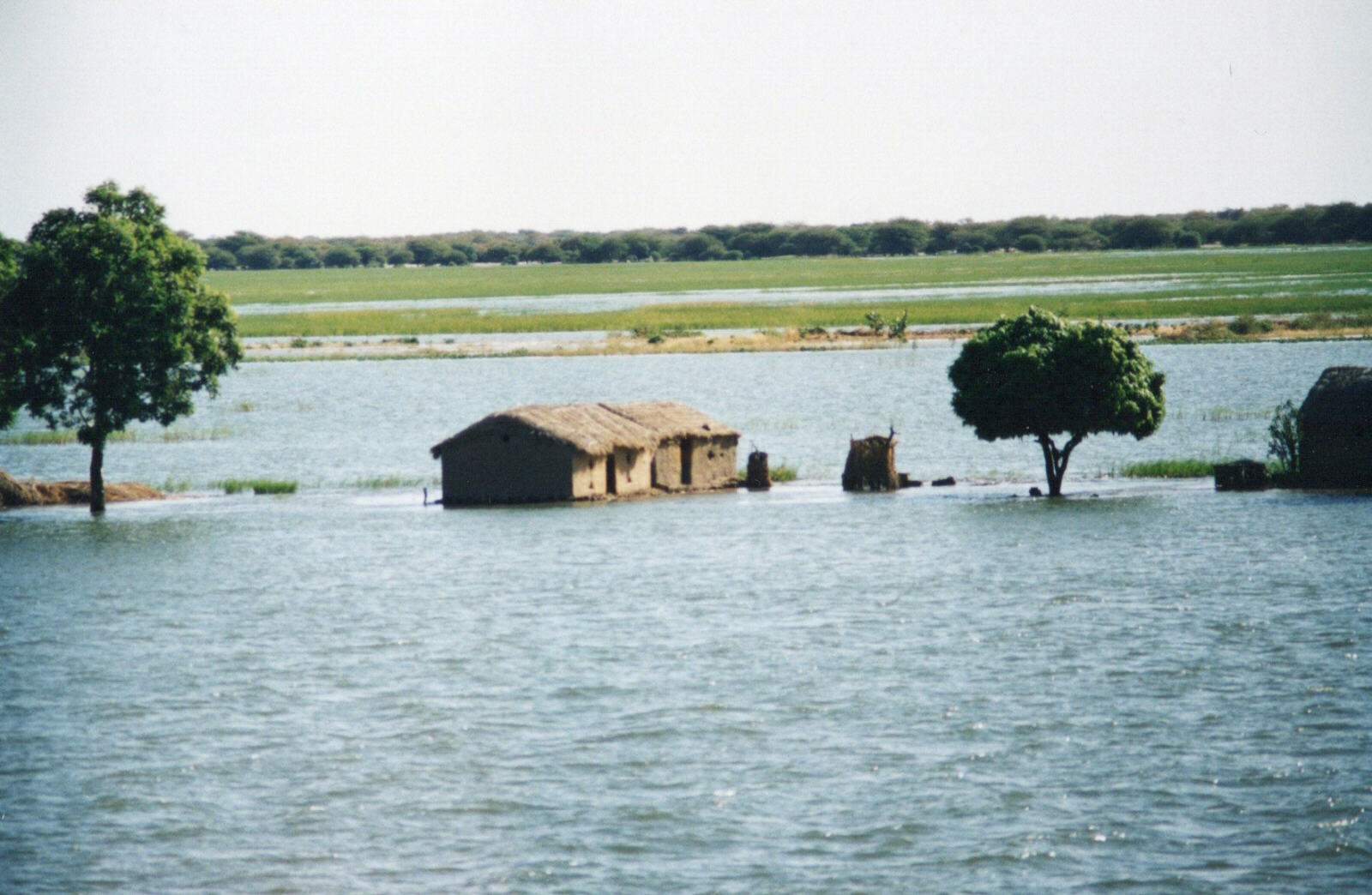
|
At 7 o'clock someone rang the bell to announce breakfast - a good, old-fashioned, shake-it-about, clangy sort of bell. As our first meal on board it wasn't particularly exciting - a cup of coffee, half a French loaf and a lump of camel butter. We returned to the cabin to watch the ever-changing yet unchanging view and anticipate lunch. At about 8:30 we stopped for quarter of an hour at a little mud-brick village on the river bank. There was no quayside, the boat just grounded gently on a sandbank by the village centre and several canoes came alongside with ladies selling dried fish to the lower deck (3rd class) passengers who had to make their own catering arrangements. There was a man slowly and methodically dismembering a couple of goats on the shore but he didn't try to sell any meat to anyone on board. No-one seemed to get on or off so it must have been just a provisions stop. Looks like it's dried fish for lunch! |
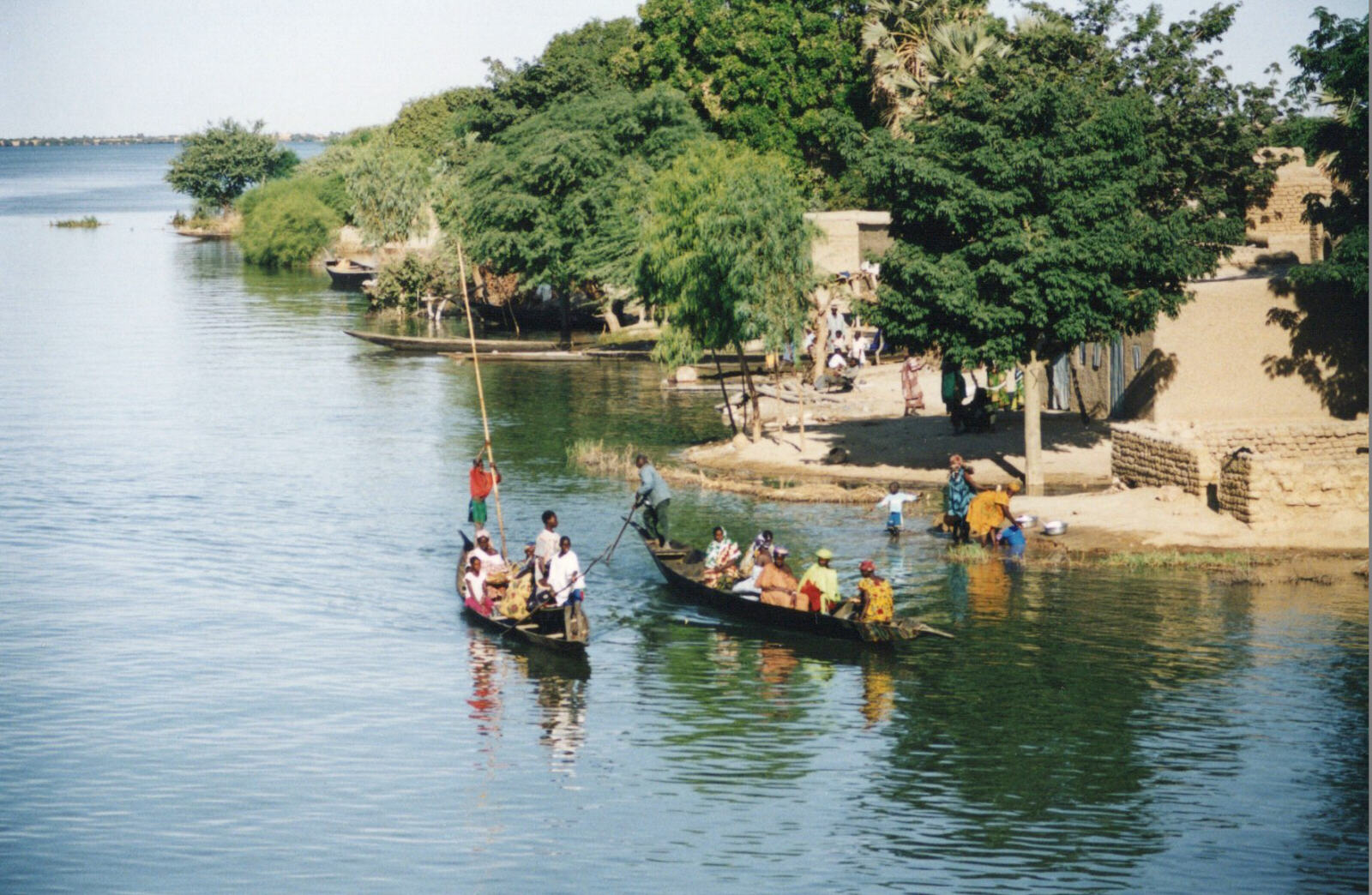
|
We drifted the morning away reading, dozing and watching the view slide past. |
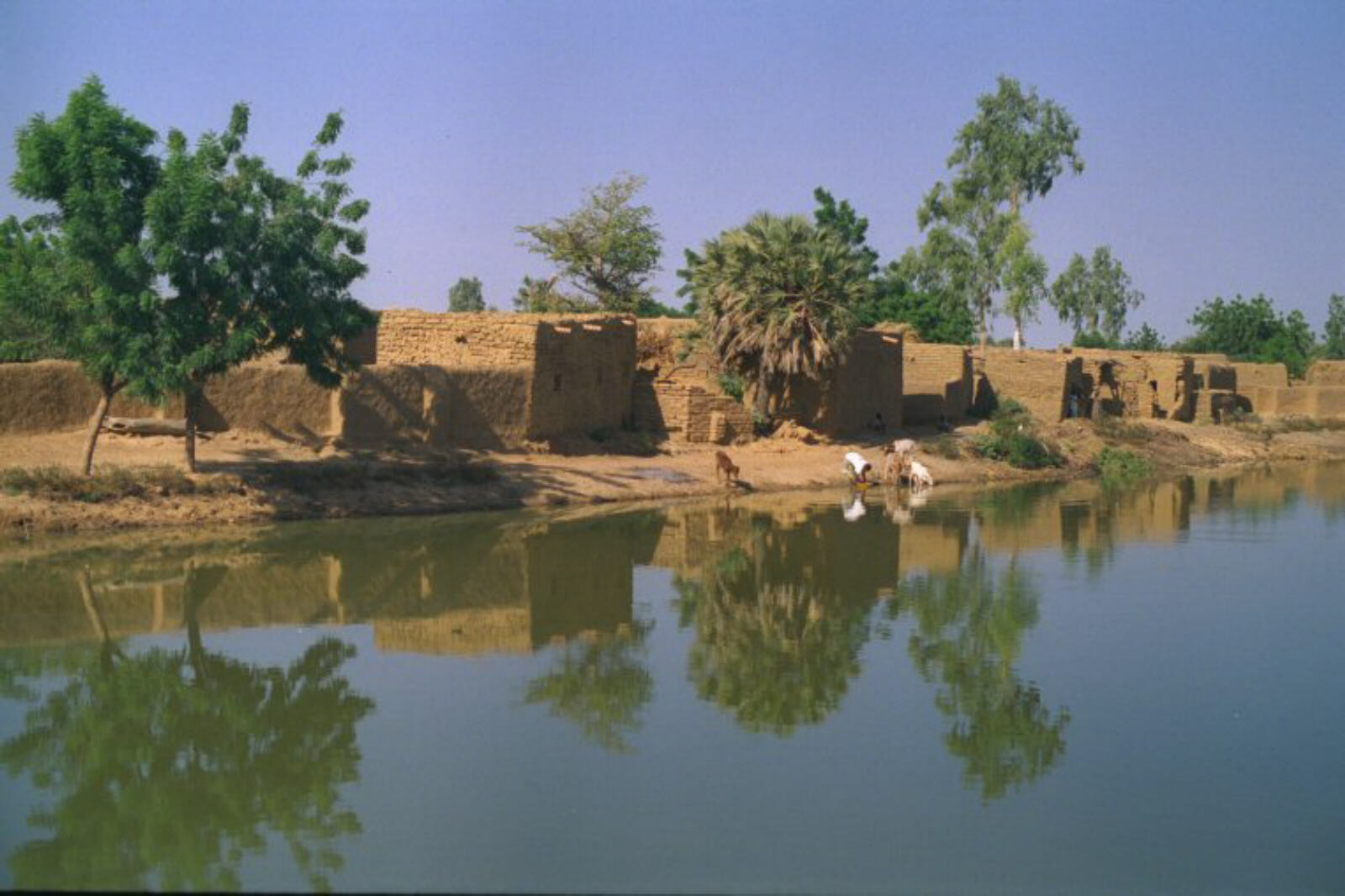
|
It was pleasantly cool at first but pretty hot again by midday. Just after 12 they rang the bell for lunch, which wasn't at all bad. The starter was a tomato and chilli salad (but the chillies weren't too hot), then a big plate of rice with vegetables and a piece of fish. The fish was quite meaty and tasty once you prised it off the bones, but Sheila got the tail end which was very picky and the man next to her had the head end which watched her all through the meal. The meal was finished off with an orange each.
The afternoon was much the same until about 5pm when we made another stop. This was a slightly bigger village with a stone quay about half the length of the boat. They let down the gangplank and there was much coming and going of people and goods, and one old chap got on dragging a very reluctant goat behind him. People were barbecuing food and it seemed like quite an event. The whole village population gathered on the riverside to watch us depart. |
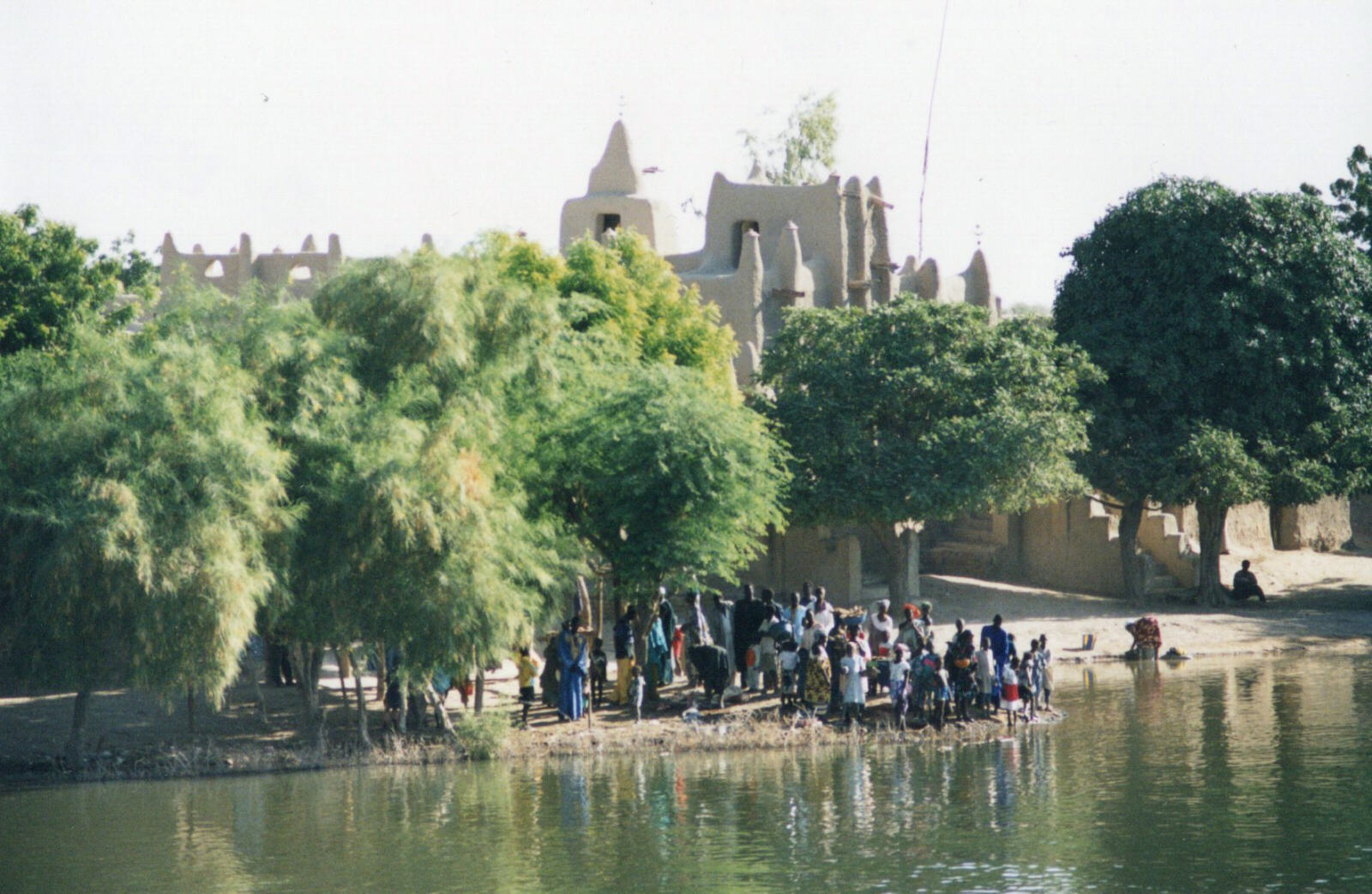
|
Dinner on the boat that evening was very good - soup, steak and onions and watermelon to finish. |
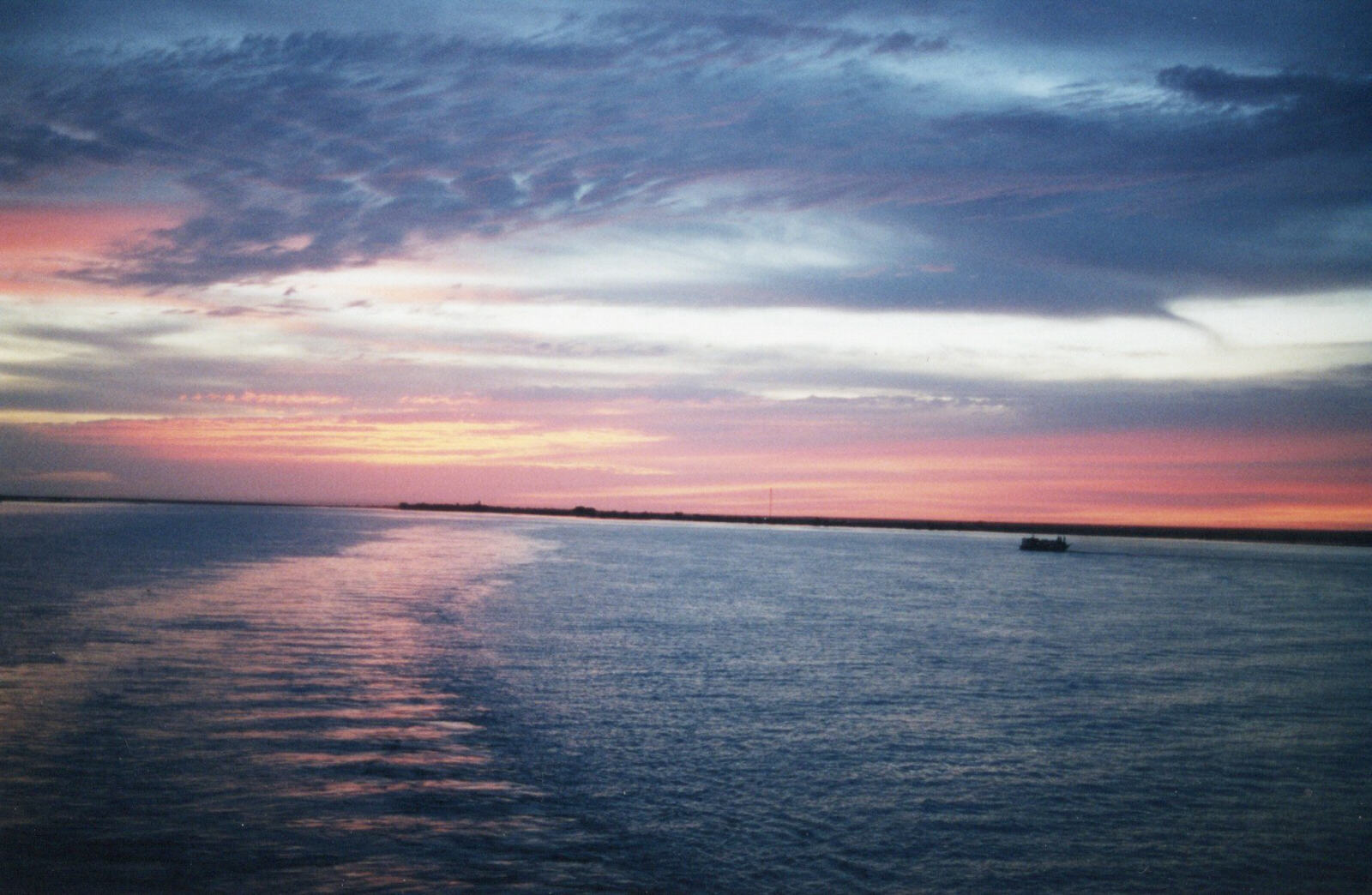
|
Mali - Timbuktu
|
Mon 23rd. Everyone had been very vague about how long it would take to get to Timbuktu, but hazarded either two or three days. With our Western literalness we took that to mean at least 48 hours, so Monday evening at best, more likely Tuesday. So we were all set for another lazy day drifting down the river when about 9:30am we pulled in for another stop. We were standing at the railing idly watching the hustle and bustle below when people started telling us that this was the stop for Timbuktu! We weren't sure what to believe until the Commissar of the boat came along and confirmed it, so we frantically packed and decamped onto the quayside, feeling simultaneously excited at arriving and cheated out of a day of drifting along.
The river has moved over the centuries and the port is now some 10km from Timbuktu itself. There were no taxis so we waited in the shade with our fellow passengers until the single truck/bus had returned from its previous trip to the town and we all piled on. It was just as crowded as the bus from Mopti to Sévaré had been but we grimly protected our space and in about 20 minutes we finally arrived in Timbuktu. The bus dropped us at the police station in the centre of town because they know all strangers have to register there. The police were very friendly and we got the all-important 'Tombouctou' stamp in our passports. A tout from the Bouctou hotel attached himself to us which was useful because we wanted to stay there anyway, so we made him take us first to the Air Mali office to try and get on Wednesday's flight out. There are only three flights a week and having got here, the top priority is to get away again! However, the flight was full and we had to go on the waiting list; this could be a disaster, we could be stuck here for days and there isn't exactly a lot to do.
The tout took us to the hotel, which wasn't too bad - an air-conditioned room, ensuite shower room, two beds with mosquito nets for 25,500 CFA (£28). All we have to do now is wait; we'll go sightseeing when we know we've got a flight out. We tried to wait under the trees in the dusty garden behind the hotel but there were a lot of flies and a lot of touts (mostly Tuareg selling cheap jewellery and rides on their camels) so we retreated into the restaurant for some refreshing watermelon. We whiled away the afternoon writing postcards and playing cards. It was too hot to do anything else but the locals laughed and said how cold it is compared to the summer - they are all wearing thick coats!
Before dinner we celebrated the achievement of our arrival in Timbuktu by drinking the small bottle of airline champagne that we had carried all the way from the Dakar flight with us for this very purpose, accompanied by the last of the peanuts we bought from the street stall in Dakar. We had dinner at the Bouctou but it wasn't a great success - the only choices were steak or omelette so we had one of each. The steak was the chewiest imaginable but we persevered and between us we finished it.
Tues 24th. After the standard continental breakfast at the Bouctou we arrived on the doorstep of the Air Mali office at 8 o'clock sharp ready to beg, plead and grovel for places on tomorrow's flight. At 8:05 the caretaker arrived and opened up the office and at 8:10 the Director arrived, by which time we were sitting in chairs in front of his desk. After some pleasantries he asked if we would like tickets for tomorrow's flight. Resisting the urge to throw ourselves on the floor and hug his ankles we said yes, please and he wrote out the tickets. Flushed with success we walked down to the Post Office and bought stamps for all our postcards. The man behind the counter was very helpful, telling us it didn't matter if we stuck the stamps on sideways because, as usual, we hadn't left enough room for them above the address. He then stamped every one very carefully so the 'Timbuktu' postmark was visible and we put them in the box. Most of them arrived the week after we got home.
Having completed the admin more easily than we dared hope we went on a walk round Timbuktu, looking at the old mosques, decorated doorways and mud-brick houses.
|
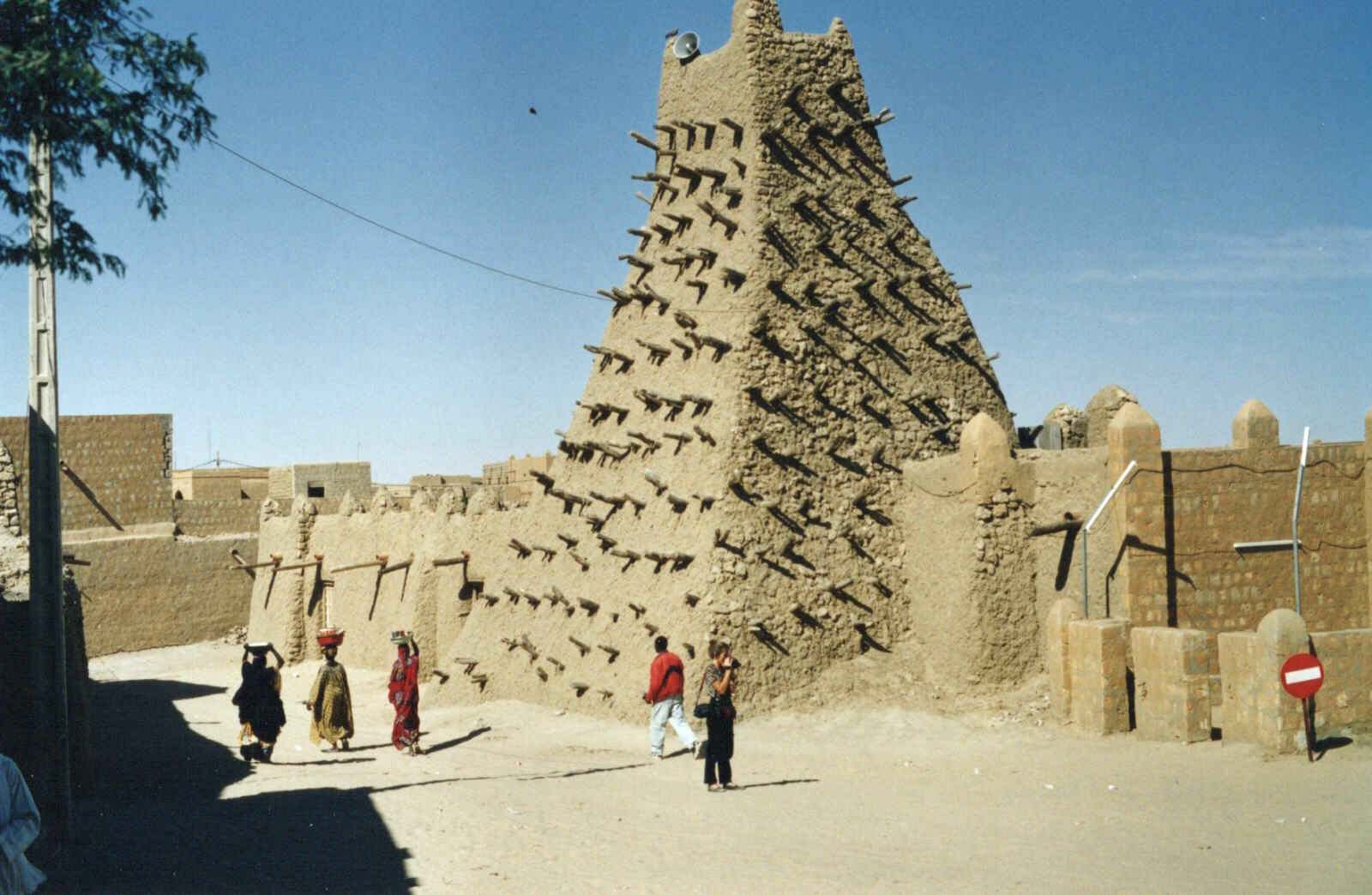
|
In the middle ages Timbuktu was a rich and powerful city and had one of the biggest universities in the Arab world. It is now sadly run down and is a very smelly, fly-blown place. Every child you pass wants a 'cadeau', all except for one little toddler who attached himself to Sheila and came along with us for some way until his big sister forced him to go home, whereupon he screamed irreconcilably until we were out of sight. By 11 o'clock we had finished the tour and, for a change of scenery, went to the Azalai, the only other hotel in town, for a cold drink and a read. |
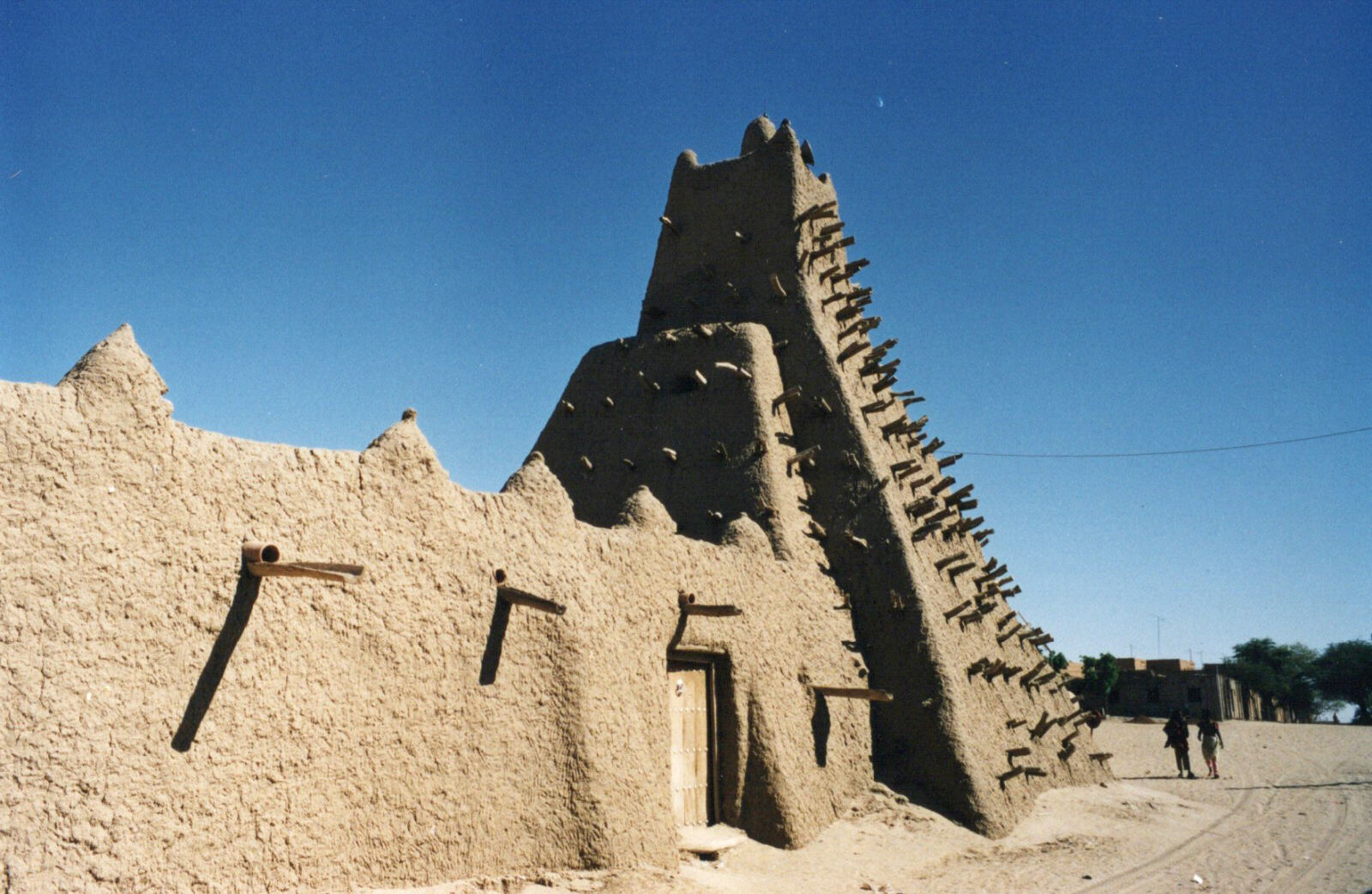
|
We whiled away the afternoon heat back at our hotel then about 4 o'clock went for a walk to see if the Post Office was open to send another card. It wasn't, but by zigzagging more or less at random through the old town we found a couple of the 'sights' that we had missed this morning - the houses where two of the early explorers (one Scottish, one French) lived when they 'discovered' Timbuktu in the early 1800s. |
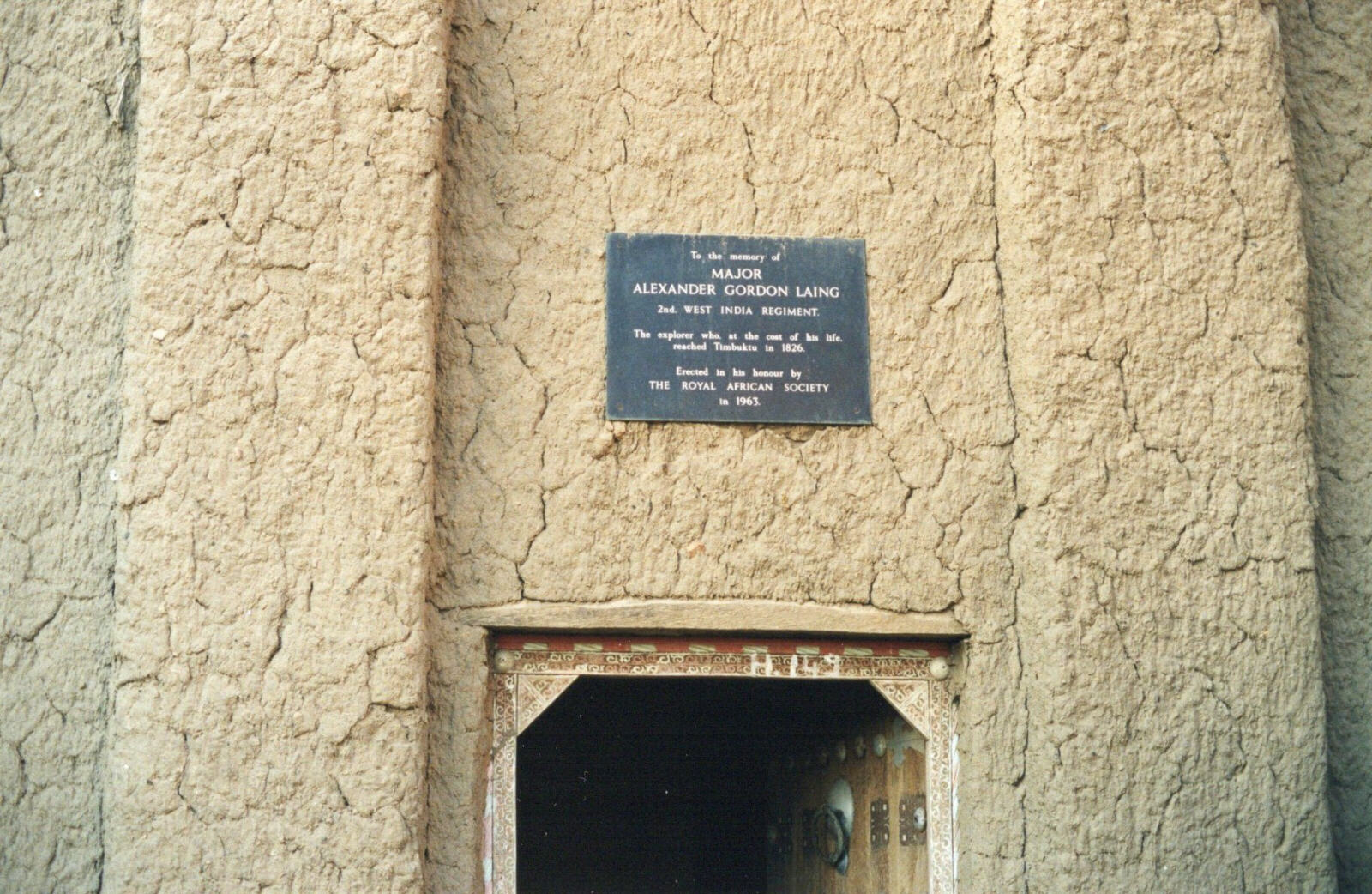
|
We also found two of the bread ovens in operation - these are weird-looking conical constructions about 6 feet (2 meters) high with a smoke-blackened square opening in one side, often plonked in the middle of the street. |
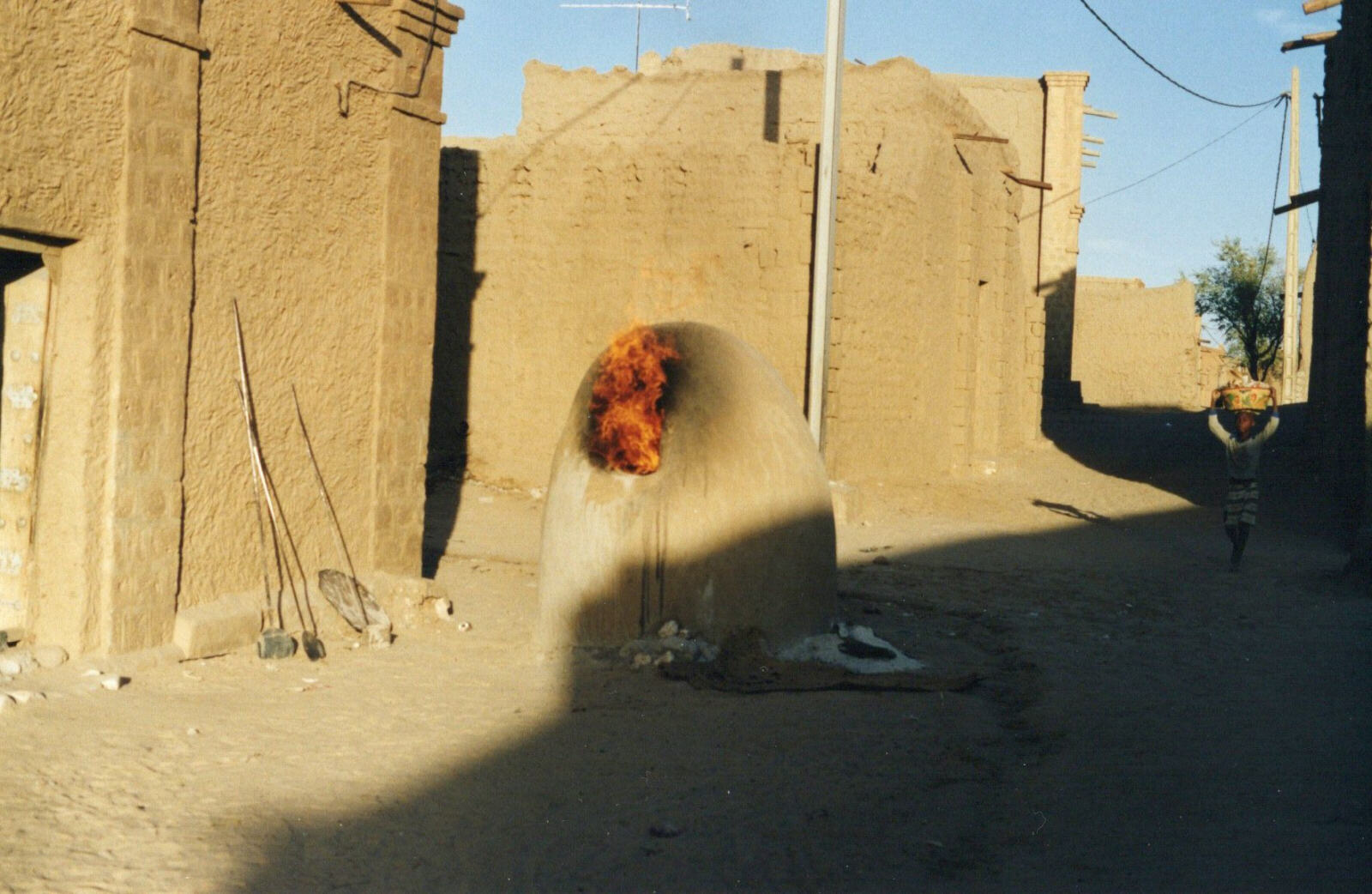
|
Back at the hotel there didn't seem to be anything at all for dinner so we played cards, had a packet of biscuits and the last of the Fantas we bought before we got on the boat in Mopti and didn't bother.
Wed 25th. We were up at 5am and ready for the taxi to the airport at 6, but of course there wasn't one. In fact the hotel was all locked up and nobody was about. Gradually it came to life and when a vehicle pulled up outside and the driver wandered in and sat down we asked if he was a taxi. He said yes but really he meant that he was there to collect someone else but was prepared to make a few bob while he was waiting. He took us to the airport for 5000 CFA (£5.50) and we took up position at the deserted check-in desk and played cards on it. Gradually the airport came to life and when the check-in man arrived (the same man who gave us our tickets yesterday) we were at the front of the crush. We needn't have worried because the 'plane was not full but we had heard so many horror stories of people with tickets not getting on the plane and being stuck in Timbuktu for a week that we wanted to make sure. The aeroplane had about 44 seats, looked very old and most of the writing was in Russian. Soon the captain turned on the HE KyPNTb sign and we were off.
There is nothing but desert between Timbuktu and Mopti yet amazingly we made one stop. We landed on a gravel airstrip in the middle of nowhere, all trooped off the plane clutching our 'transit' cards and stood about for ten minutes before we got back on. It was so remote that there weren't even any Tuareg trying to sell us things. As we flew over the Niger river area there was no obvious channel, the water seemed to have spread out over the desert in lakes and puddles as far as we could see in every direction, yet there was little sign of agriculture, it was just lying there evaporating in the sun. |
Mopti yet again
|
While we were waiting for our luggage at Mopti airport Sheila checked out the taxi touts and found one whose price seemed reasonable at 3000 CFA (£3.30) to Mopti town. He had a uniform on and I wondered if he worked in the airport but she thought not. He asked if we could wait till the plane had taken off for its next destination, which we did. It was only when we were driving into town with another man in the same uniform that we realised that they were the airport firemen! Now the plane had gone for the day their job was finished. He took us down to the Ouagadougou bus office, which we had found during our previous stay, where the old chaps who always sit there now greeted us as long-lost friends. Seats on the bus (actually a little minibus) are 11,000 CFA (£12) each but it's a bit of a rough overnight journey so Sheila negotiated the whole back row, 4 seats, for 38,000 CFA (£42). The fireman then took us to the Sigui restaurant where we had been looking forward to the greatest treat of all - real food! We had two of their excellent beef curries, our first real meal for days. We spent the time waiting for the bus at Bar Bozo, watching the boats loading and unloading all around us in the busy port.
The overnight bus to Ouagadougou takes 21 hours so we were expecting it to be rough going. It was sheer hell. The hour and a half after 'departure' time was taken in constructing a mountain of luggage on the roof which was half as high as the bus itself. Inside, there were four rows of seats which almost take four people per row, including the fold-down seat in the aisle. Of course nobody counts children so several of them had to fold themselves in around the adults who were all squashed together overlapping each other along the row. There was clearly some discussion about why there were only two of us on the back seat but the driver explained that we had bought four places so nobody tried to occupy our space. Despite the extra width there was hardly any legroom so it was pretty uncomfortable, some of our luggage was crammed in with us and unfortunately some of our fellow travellers smelled extremely pungent before we even started. |
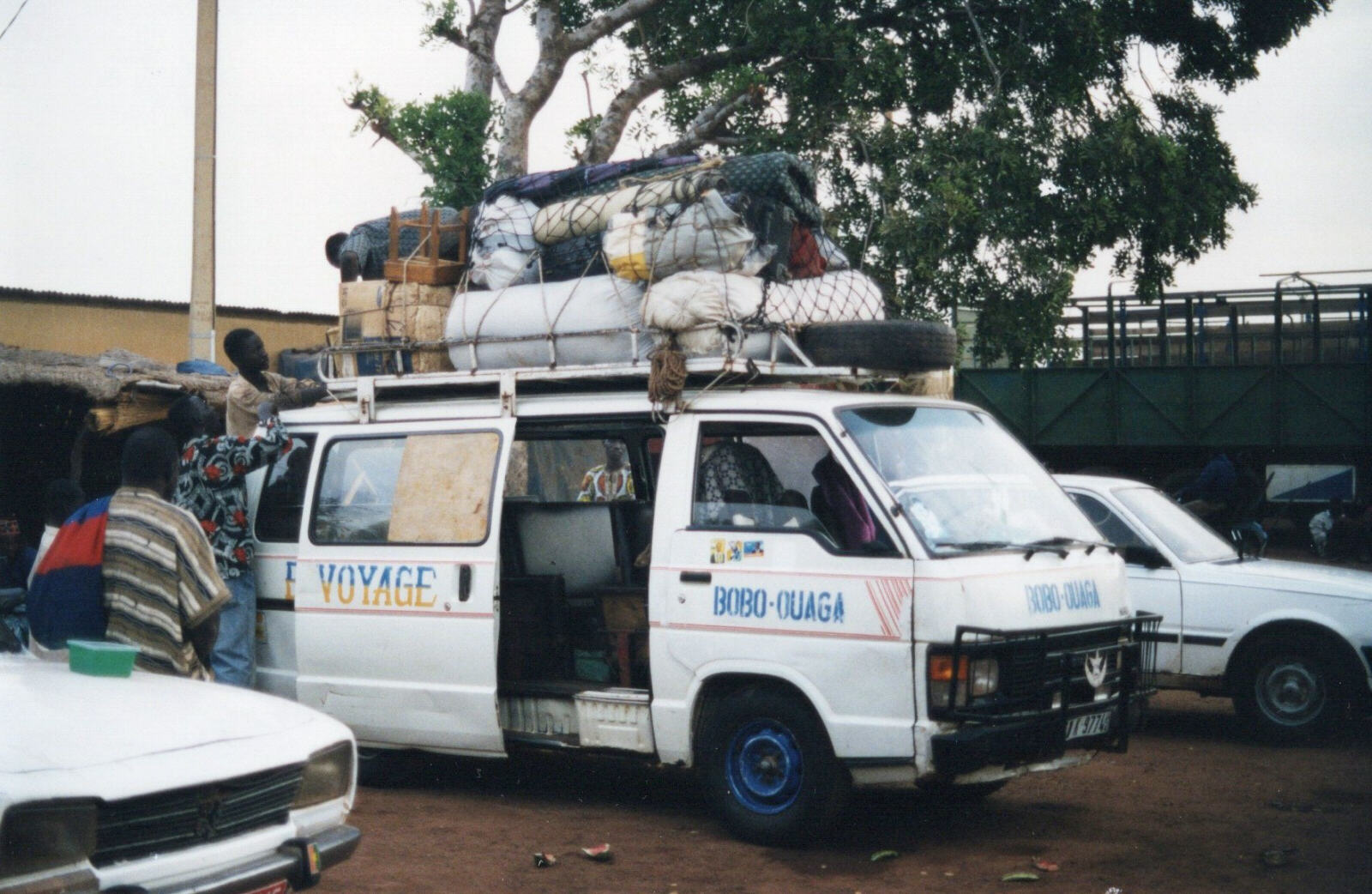
|
The 5pm bus actually got going at 6:30 and it would have been almost bearable if we had kept going, but we didn't. Throughout the journey we didn't go more than an hour without stopping for something - endless police checkpoints, buying bits of food and many stops for no apparent reason at all. The most dangerous part of the whole holiday was filling the minibus up with petrol - this involved violently shaking the fully-loaded bus from side to side to get the petrol to go down the pipe, but not necessarily bothering to switch off the engine or extinguish your cigarettes. It was never clear how long we were going to be stopped at each halt so we didn't know whether to get down and stretch our legs or not, because it took about half an hour to find a comfortable position when we started again. Then, in the middle of the night we stopped because the driver was tired and wanted a sleep. He took his sleeping mat, which Sheila had been using as a blanket, and he and all the other passengers disappeared into the pitch-black African night to sleep somewhere. We stretched out on a deserted seat each. The stars were beautiful but it was still uncomfortable and I didn't sleep at all. |
Burkina Faso - Bobo-Dioulasso
|
Thurs 26th. Soon after dawn we got going again and crossed the border from Mali into Burkina Faso. We clearly had a couple of 'illegals' with us because before and after each of the border posts and checkpoints we stopped, these two got off and headed into the bush, then when we were a reasonable distance the other side we would stop and wait for them to catch up again, which they did amazingly quickly.
We arrived in Bobo-Dioulasso, the second biggest city in Burkina Faso, about midday. We could have done it in literally half the time if we had just kept going. To our surprise at this point they told us to get off and get on another bus - it seemed that we were the only passengers going on to Ouagadougou so they bought us tickets on the local bus service. We started to protest because they only bought two seats on this bus and we had paid for four all the way through, but when we saw the bus we gave in because it was a proper bus with comfortable seats, leg room and luggage racks - real luxury! Sheila elbowed her way to the front and got the best seats, the bus started off soon after we got on and only stopped a few times along the way, so we almost started to enjoy the journey. Halfway there all the passengers suddenly started pointing at something out of the window and there in the bush, about 100 yards from the road, was a herd of elephants! The bus driver slowed down but didn't stop. This must be a rare sight because even the locals were excited about it. |
Burkina Faso - Ouagadougou
|
We arrived in Ouagadougou about 5pm and took a taxi to the Ran hotel, which we chose from the book because it was described as 'colonial-era' and is centrally located. It was very nice. We showered away two days' worth of dust and grime, changed into clean clothes and felt human again. The hotel has a pleasant, airy open dining area beside the pool, where we had a very welcome cold beer before going to a French restaurant called the Fontaine Bleue, run by a nice French couple, where the food was good but we found we couldn't eat much because we're so out of practice! In the last four days we've only had one proper meal which was the curry at Sigui's, and some bananas and biscuits. Went back to the hotel to catch up on some sleep. |
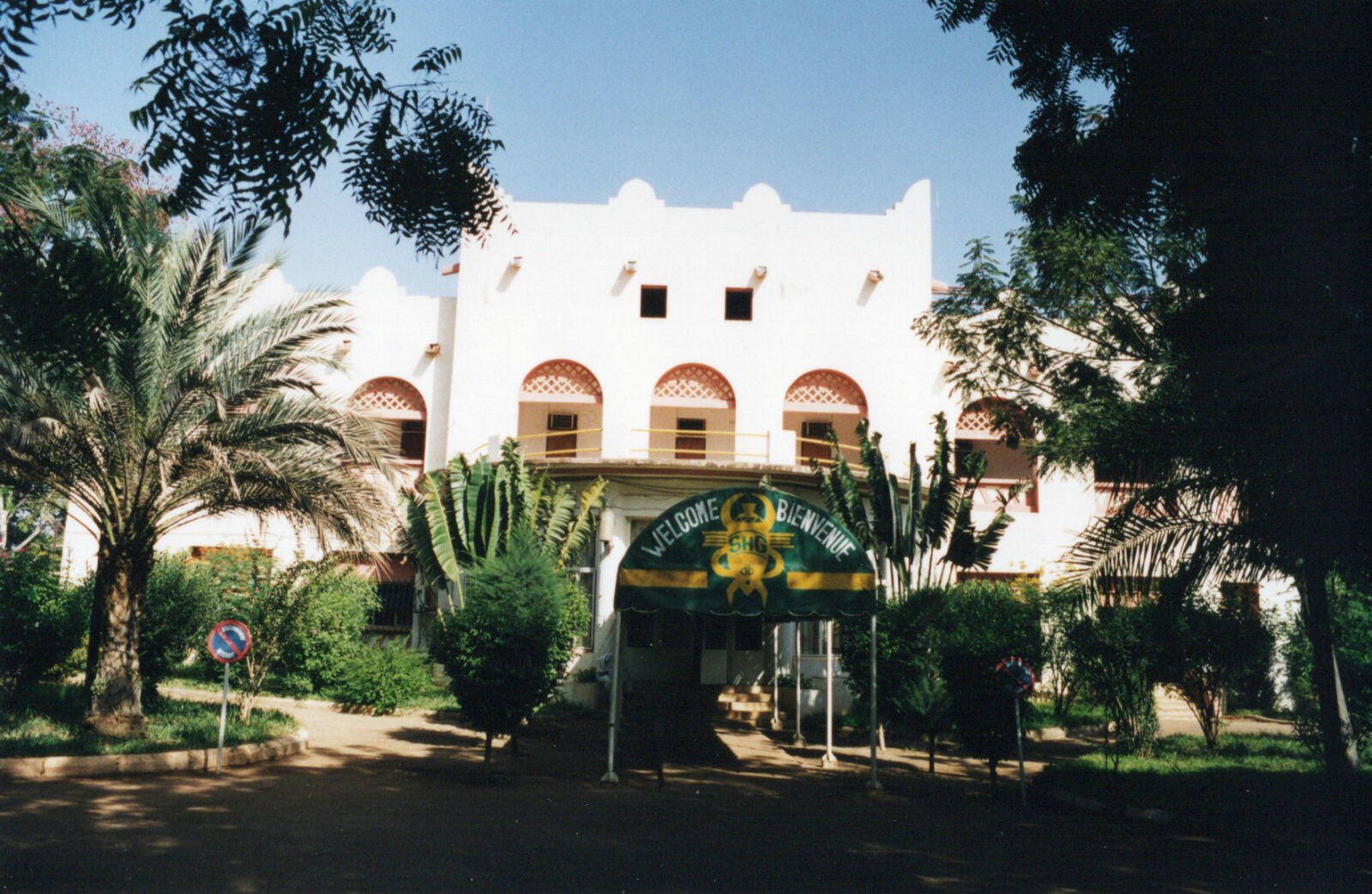
|
Fri 27th Nov to Fri 4th Dec. Days at leisure in Ouagadougou (Wagga-doo-goo).
We didn't intend to stay so long, but there was a mix up with the flights back to Dakar. We went to the Air Afrique office to arrange the flight and the lady there told us that tomorrow (Saturday)'s flight was full and the next one was on Thursday. At first this seemed like a problem but thinking about it we realised that it is more pleasant here than Dakar so maybe it's not so bad after all and we booked for Thursday. When Thursday came I checked the tickets (OK, OK, I should have checked before) and found that the flight actually left on Tuesday. This meant that we ended up on the next Saturday's flight and spent eight full days in Ouaga.
We soon fell into a pleasant routine of eating, wandering round the market and sunbathing by the pool. Our favourite spot for breakfast was the Patisserie Bonbonnière just down the road from the hotel, which did a wonderful Jambon and Gruyère baguette et thé Lip-ton. In West Africa tea is actually called Lip-ton because Lipton's tea bags seem to have cornered the market. Our alternative breakfast was to go to the Gourmandises Snack-Glacier, at a table on the balcony overlooking a corner of the market and have a shawarma sandwich and a gateau. This was a fascinating spot with lots of activity in the market below and even more in the vast moped parking area beside it. We wandered around the town and 'did' most of it in the first morning. There is not a whole lot to do, but it is a pleasant place and apart from round the market area fairly hassle-free. In subsequent days we were hassled less and less as the hustlers began to recognise us and gave us up as a dead loss as far as selling anything goes. On the way back to the hotel we bought mangoes, papaya and lemons from a street stall for lunch. We sunbathed by the pool until the heat drove us into the shade, then one of the hotel waiters prepared the fruit for us - juicy mango and scooped-out papaya with lemon juice squeezed on.
One day we set out to find some books in English because we'd finished all ours. All the bookshops, such as they are, only have French books. We met an American student who was here to study African film-making, outside the Café de la Paix and he recommended that we bluff our way into the American Recreation centre attached to the embassy, where they have a library. We took a taxi to the embassy in Rue J F Kennedy and found the rec. centre in the street behind, with a big sign 'members only'. There seemed to be nobody there at all so we walked in, past the swimming pool, through the bar and found the library, well stocked with English-language books. We browsed around and swapped three of ours for two of theirs and went out, saying 'Hi' to the people who had come in since we arrived.
We got to know a very pleasant chap called George who ran a supermarket opposite the Central Market for his uncle, who owned four such supermarkets in Ouaga. They were from Syria; from our observations all the supermarkets and half the restaurants in West Africa are run by Lebanese or Syrian people. George worked seven days a week, from 8am to 8 or 9 pm with a couple of hours lunch break, and at the end of his stay hopes to have saved up enough to buy a house back in Syria. One evening we went round to George's house to meet his friends and had tea and chatted and another time we went round for lunch, while George's flatmates and co-workers in the supermarket chain kept coming in to take a look at us!
We also got to know Salif, an accountancy student from Ouaga who finances his studies by working in George's supermarket. One evening we met up with Salif who took us for his tour of Ouaga (after we had had a pizza at Sheila's insistence, because she was hungry!). We started at the artisan workshop where they make the wooden and metal statues that they sell on the street stalls outside the hotels, but it was closed. Then we walked 3 or 4 km out to the lake to the north of the city. It is actually an artificial reservoir surrounded by raised, well-lit roads, with a big modern hotel at the far side and some trees growing in the water, covered in white birds resting for the night. It was very pretty. We went back to George's house after he had closed the supermarket, for a Lebanese meal. He doesn't eat meat so we had spicy Tabouleh, Humus and Metabele while he played assorted American and Middle Eastern pop music on his computer. He had subscribed for an internet account but had been waiting months for the telephone connection to be able to use it. We were just walking back to the hotel with George when one of his Syrian colleagues drew up in a car and said did we want to go to the lake, so we all piled in and went for a midnight drive to see the lake for the second time today. I think we have established that the lake is the prime 'sight' in the Ouaga area.
We found several nice restaurants for dinner. The first we tried was L'Eau Vivre, a French restaurant not far from the hotel, run by nuns. It was excellent. We sat out in the garden dining area under flowering trees by a fountain and Sheila had steak in a Roquefort sauce and I had steak tartare du cheval. Yes, raw horse meat! It was deliciously rich, mixed in with the garlic, onions, capers and parsley, moistened with olive oil and seasoned with a little salt and pepper. At 10 o'clock the nuns came out and sang Ave Maria to the diners. We decided to try African food, but in the sanitised surroundings of a French restaurant, so we went back to le Fontaine Bleue and had Kedfenou (chicken in onion and tomato) and Arachide (beef in peanut sauce) with plantains and rice. It was an interesting experiment. We also tried the Sindebad restaurant where we had shawarmas. Our favourite, however, was the Verdoyant, an Italian restaurant down the road from the hotel, which we went back to several times and had the best meals of the holiday. One time we just had pizza and lasagne washed down with Beaujolais Nouveau; another time I had filet of Barracuda with anchovy butter, with garlicky haricot verts and potatoes Dauphinoise while Sheila had the salami pizza and a tomato and onion salad with a couple of Kirs. Yet another time we tried steak with Bearnaise sauce - it is such a treat to find tender meat after the leather steak in Timbuktu! Wonderful.
Sat 5th Dec. Our attempt to pay the bill when we left the Ran hotel was a total farce. On arrival we had ascertained that they took Visa cards but last night, when we tried to pay prior to our early departure today, the machine would not accept our cards, giving an error message to the effect that it was 'not a local card', whatever that means. The evening staff said leave it till the morning but of course in the morning the problem was just the same. They tried it time and time again, they tried to telephone people, they drove us to banks but the banks were closed, they drove us to other hotels but they weren't interested and all the time our flight departure was drawing nearer. We didn't have anywhere near enough cash or traveller's cheques left so in the end I gave them a hand-written authorisation to take to the bank and they reluctantly let us go. We rushed to the airport and just as we sat down in the departure lounge they started boarding our flight to Dakar.
|
Senegal - St Louis
|
There was still one place I was keen to see - Saint Louis, the old French colonial capital 250 km north of Dakar, and we had intended to get back from Ouaga several days earlier to go and see it. With one day of the holiday left (we fly back tomorrow evening) we landed at Dakar on time at midday and decided to go for it. We got a taxi from the airport straight to the Gare Routière to find a bush taxi to St. Louis. Uncharacteristically, the airport taxi driver was extremely helpful - he took the standard airport fare without haggling and when we got to the Gare Routière, which was a huge melee of taxis, buses, mini-buses, passengers and sellers of everything you could imagine, he made us stay in his taxi while he found a bush taxi for St. Louis among the dozens of other destinations and negotiated a fair price for us - 2,800 CFA (£3) each for the 160 mile trip plus 500 CFA for each bag that went on the roof. Bush taxis are 8-seater Peugeot cars that leave as soon as they are full and we got the last two seats so it left as soon as we were in. The down-side of being the last in was that we got two seats in the back row which is far less comfortable - my head was wedged against the roof because the seats are higher up, and it was extremely hot because the sun was shining through the back window onto us and all the surfaces of the car itself, such as the wheel arches, seemed to be red hot.
The journey took about 3½ hours, which seemed OK to me, but near the end a heated argument erupted between some of the other passengers and the driver because (as far as I could tell with very limited French) they thought it had taken too long. I was happy enough with the way he was driving and didn't particularly want him to go any faster.
St. Louis was the first French settlement in Africa and the capital of their Senegal-Mauritania colony for a considerable time. It is in a picturesque location on an island in the mouth of the Senegal river and most of the buildings appear to date from the last century. We got a taxi from the Gare Routière on the mainland where the bush taxi stopped, across the 500-metre pontoon bridge to the Hotel de la Poste in the centre of town. The hotel is just as characterful as the guide book suggests and is very pleasant - built around a cool leafy central courtyard and with a bar featuring the trophy heads of a whole assortment of animals presumably 'bagged' by the former colonial hunters.
|
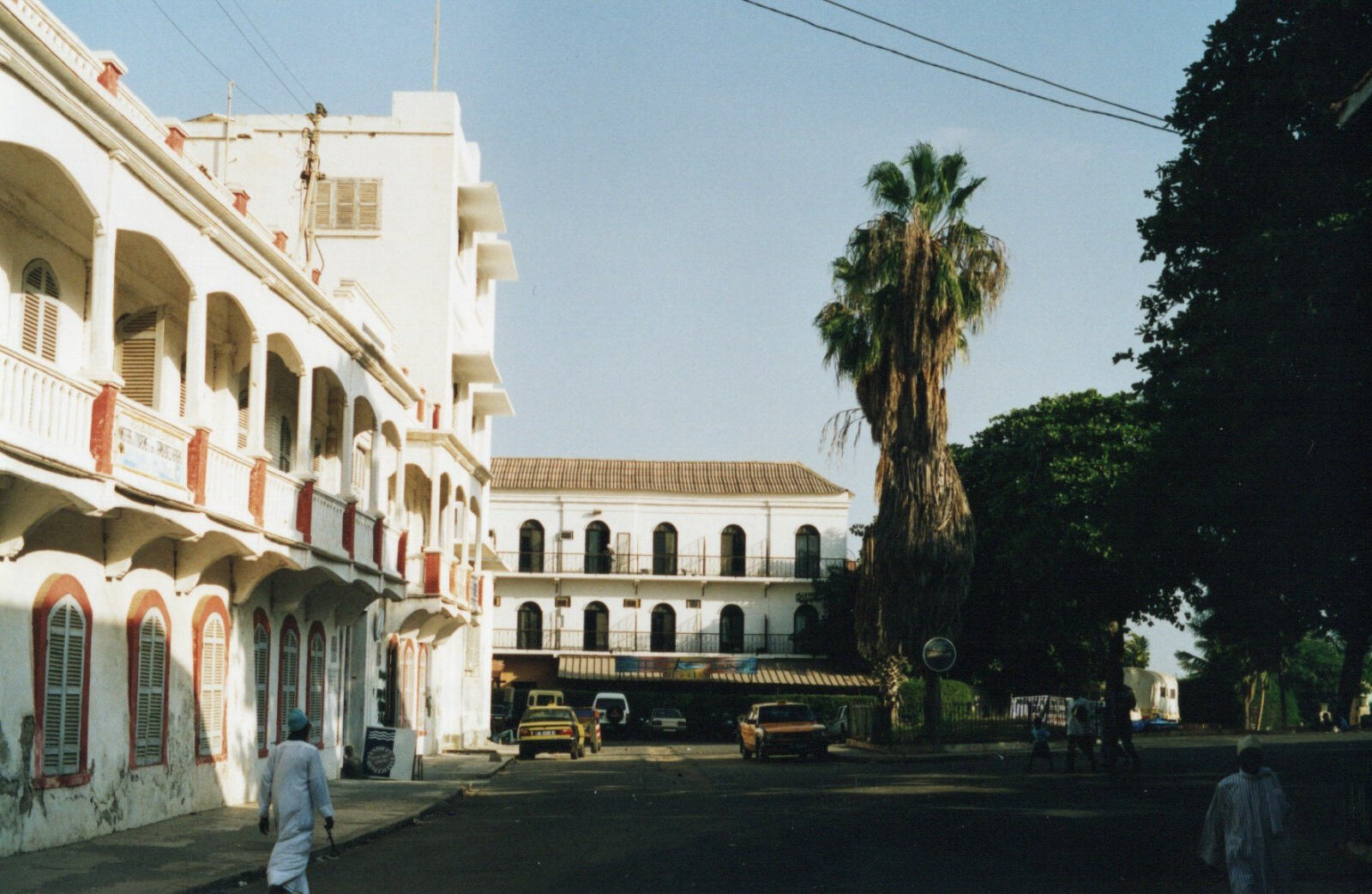
|
We asked for a room with a view of the river and it was superb - the sun was just setting and the bridge was silhouetted against the sparkling water. |
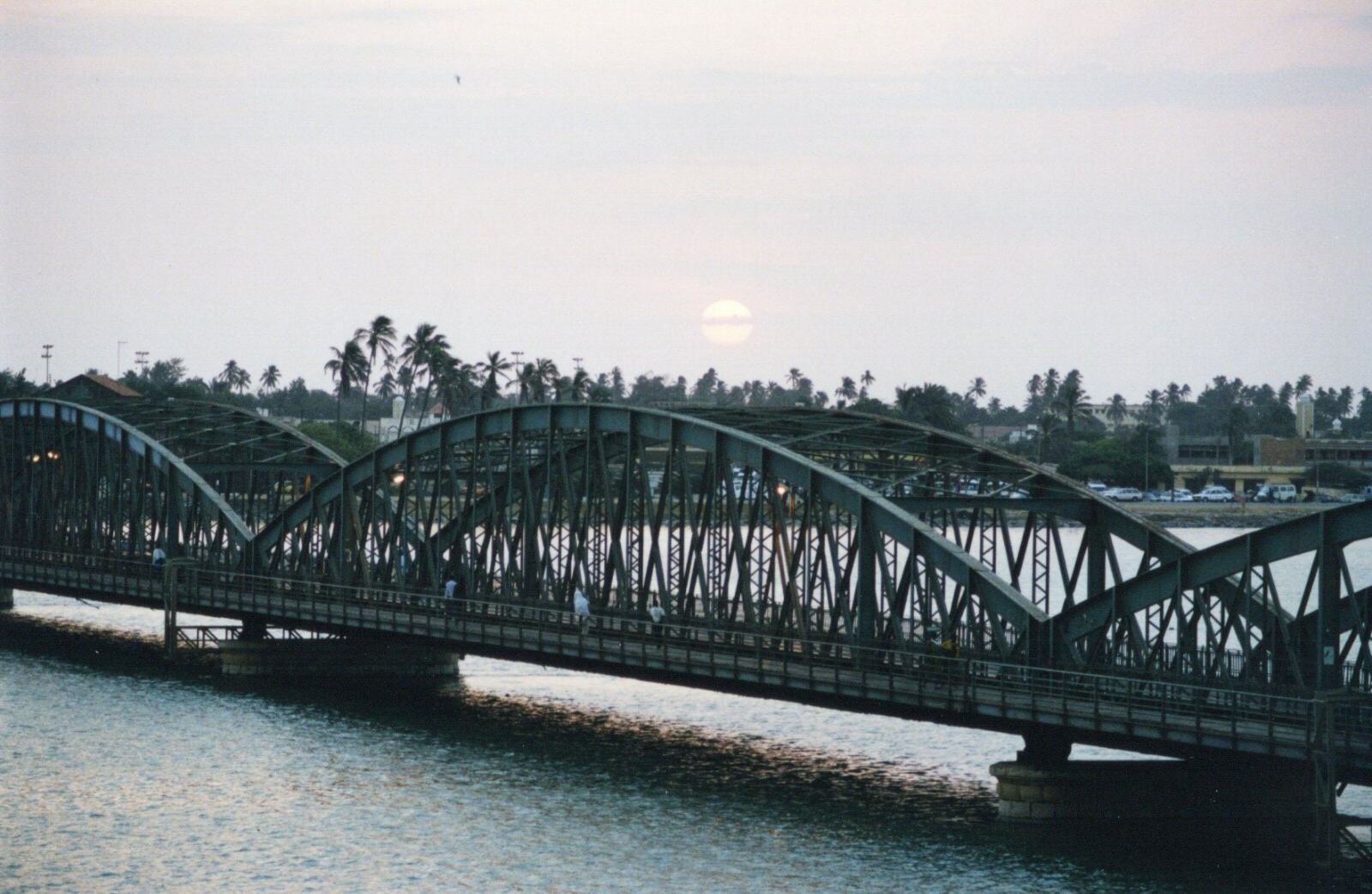
|
We went for a quick walk round before it got dark and walked over the other bridge at the other side of the island onto another part of the town which is basically built on a long thin sand spit, the other side of which is the Atlantic ocean. Here there were hundreds of fishing boats pulled up onto the fine sand beach or moored out in the waves, which were breaking strongly onto the beach in contrast to the placid river a couple of hundred yards behind us.
|
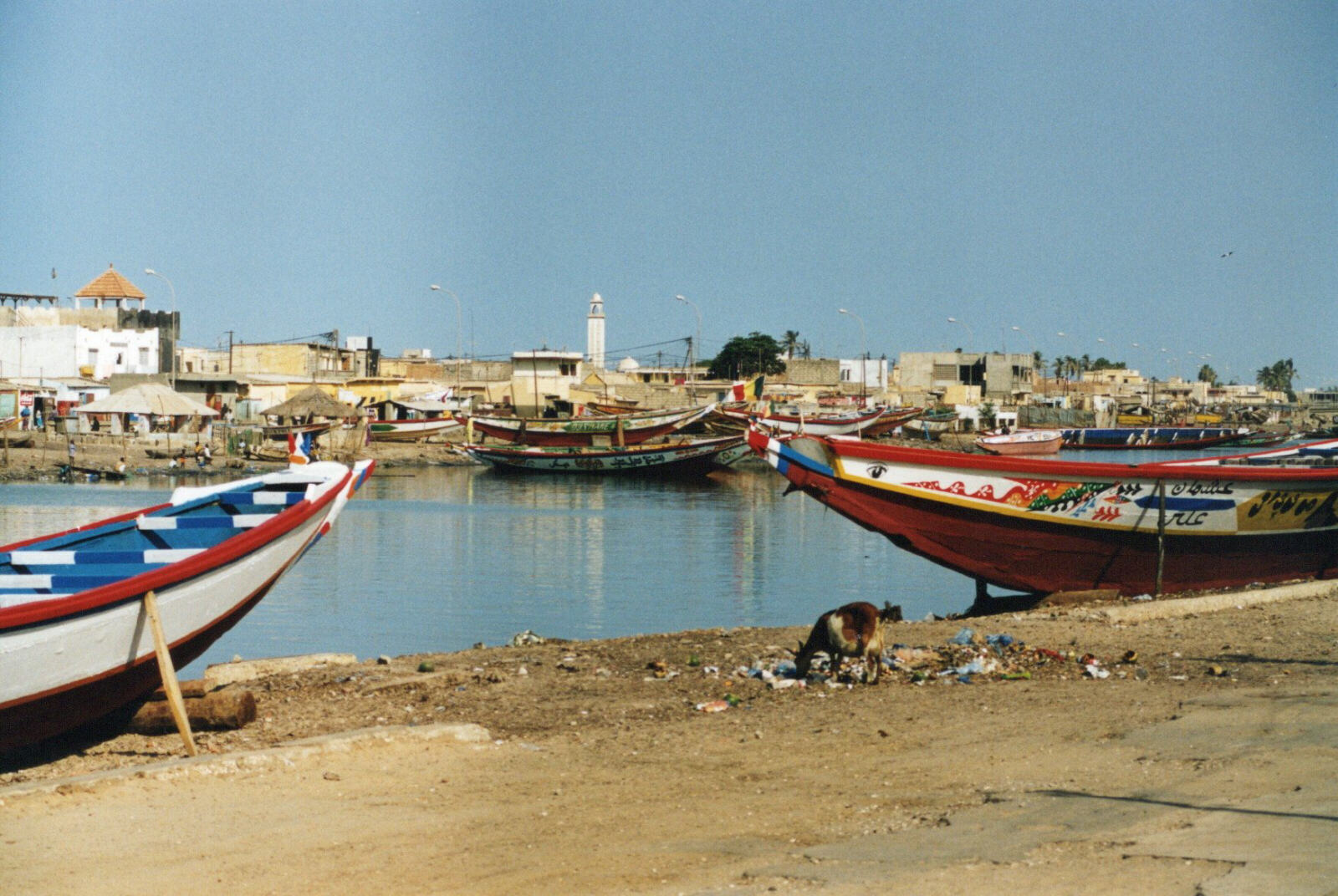
|
Sheila had a paddle in the sea, reminiscing about holidays at Blackpool, and we returned to the hotel. We had a meal in the hotel restaurant, which is decorated in an early aviation theme, with pictures and souvenirs of the pre-war route from France via Morocco and Senegal to Rio de Janeiro. The food was less impressive and rather overpriced.
Sun 6th. We set off for a walk round St. Louis. It was very quiet because it was Sunday, but very pleasant - there are lots of old colonial-style houses with wrought-iron balconies .... |
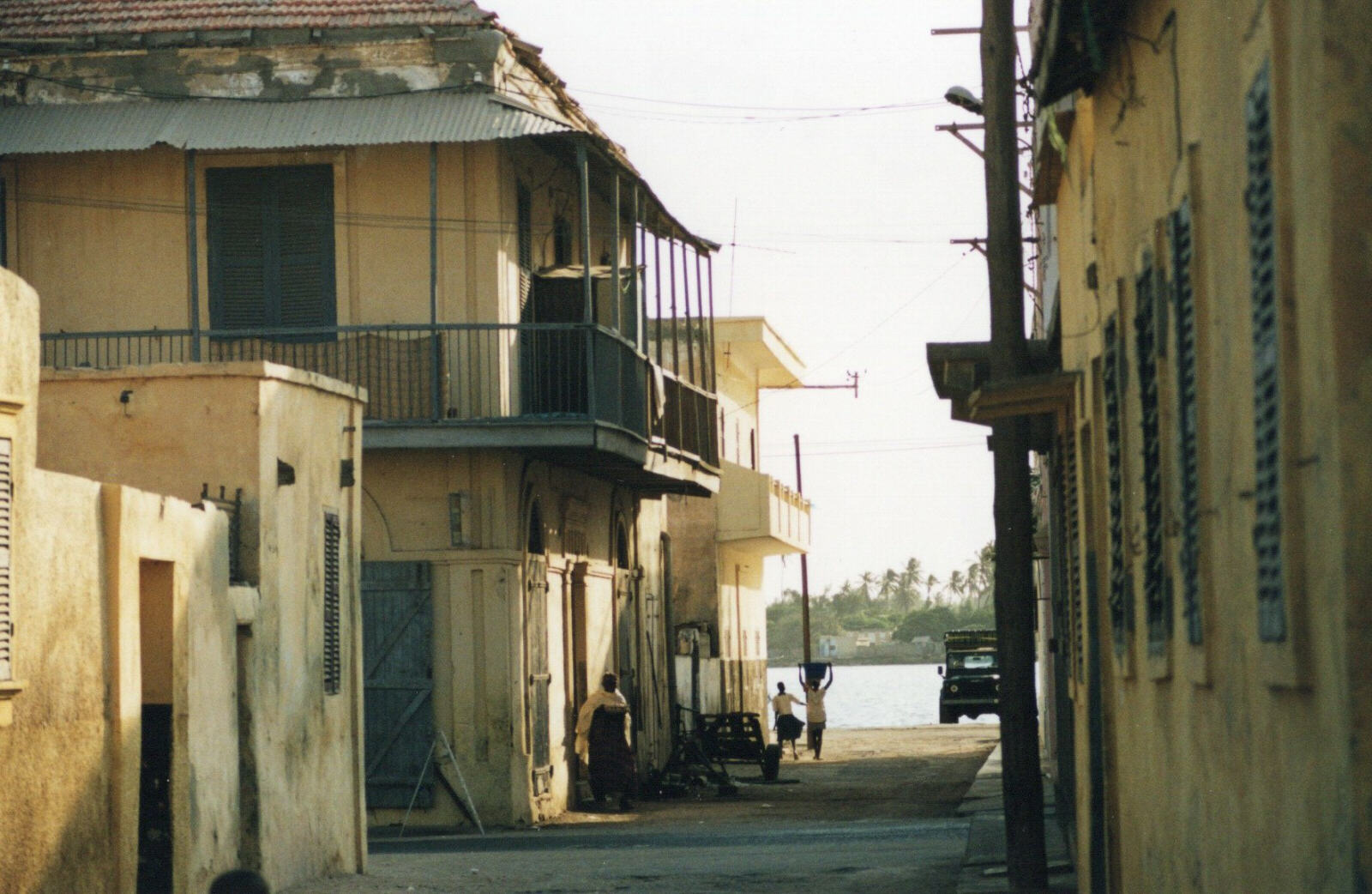
|
.... and the river along the quayside was sparkling in the sun. |
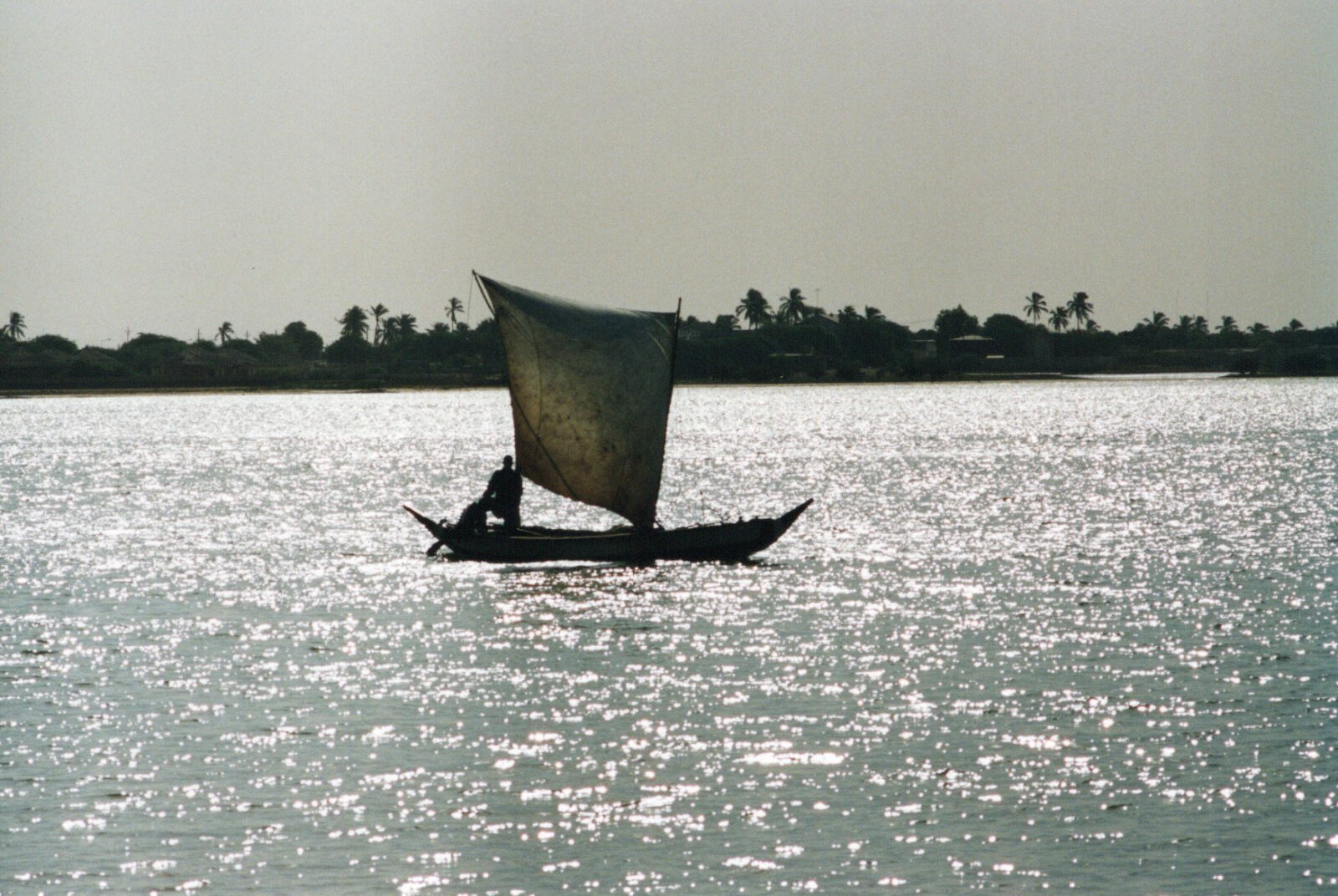
|
We zig-zagged up and down the streets to one side of the main square, then down the other side, exploring most of the island that forms the town of St. Louis. Down towards the southern end of the quay we found a picturesque, very clean hotel called the Sindone, which is newly built but in the old style. We had an excellent breakfast there of citron pressé and ham and gruyere baguettes. |
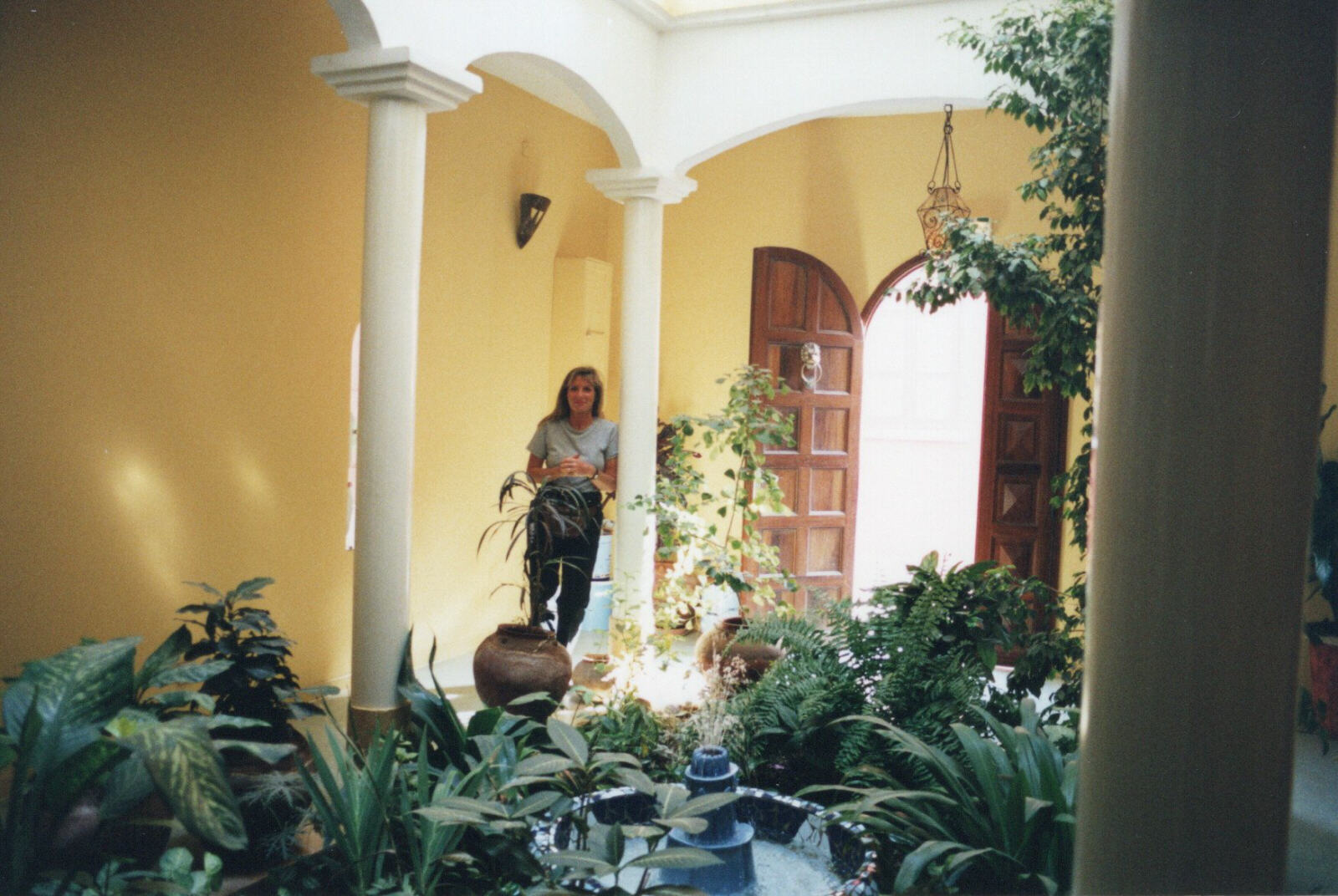
|
We returned to the Hotel de la Poste and made ourselves at home by the pool, which was in a nice green garden right next to the river, in fact we sunbathed on a wooden balcony built out over the river which was pleasantly breezy, and rolled over the side into the swimming pool when we felt too hot. As on every single day this holiday, the sun blazed down out of a clear blue sky. When we started turning bright red we stopped sunbathing and went back to the Sindone for a late lunch of exactly the same again.
Then we hurried back to the hotel where we had arranged for a taxi, apparently a friend of the receptionist, to take us door-to-door to Dakar airport for 20,000 CFA (£22) instead of messing about with a bush taxi and local taxis at each end. We set off at 4:30 and all was going fine until just after dark, about an hour from Dakar, when the clutch went. After fiddling about under the car for a while it was obvious that the driver couldn't fix it and we limped along by putting it in second gear while we were stationary, leap-frogging off using the starter motor then jamming it into fourth when we reached a reasonable speed. Those were the only gears he could get at all and this got us to the outskirts of Dakar, where the traffic started to build up and it became impossible, so he handed us over to a local taxi driver after haggling between themselves about the price - we made it clear that we weren't going to pay any more. The traffic was terrible and we finally got to the airport at 9pm, just the time we were supposed to check in, having achieved everything we wanted but with all our contingency used up!
|
If you would like to see more of our travels just click the map.
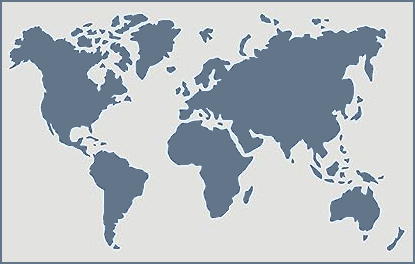
|